You're currently viewing a custom sorting.

Originally Aired: 2019-10-5
Synopsis:
Ensign Spock's first day aboard the U.S.S. Enterprise doesn't go as planned when he and Number One are unexpectedly stuck together in a turbo lift.
Problems
- The exterior shots of the turbolift are still showing huge, implausibly cavernous empty spaces all throughout the interior, this time of the Enterprise instead of Discovery.
Factoids
None
Remarkable Scenes
- Spock: "Have you ever considered that the Prime Directive is not only not ethical, but also illogical and perhaps morally indefensible?"
My Review
This coda to Discovery's second season chronicles Spock's first day on the Enterprise, as portrayed by Discovery's visual reboot of the Enterprise. It is notable that this episode takes place prior to TOS: The Cage, making it even more inexcusable for Discovery to have not recreated the recap to TOS: The Cage in its new aesthetics during If Memory Serves. If they have budget to do random codas featuring Spock, Number One, and Pike, then they had budget for that too. Indeed, the issue was never budgetary most likely, but as noted in the review for If Memory Serves, the writers were most likely taken in by the absolute worst kind of selective nostalgia: rebooting visual canon, except for when they're feeling sappy and nostalgic and want to literally reuse old shots in a stupid and jarring way. As for this story, it is mostly unremarkable. It isn't bad. But it isn't that good either. This feels more like the sort of thing you'd find perusing the deleted scenes of a film only to say, "Yeah, I can see why they cut this."

Star Trek Dis - 2x15.3 - Ask Not
Originally Aired: 2019-11-13
Synopsis:
When an attack on Starbase 28 leaves a surprise prisoner under Cadet Thira Sidhu's watch, she is faced with making a decision that may threaten her standing in Starfleet.
Problems
None
Factoids
None
Remarkable Scenes
- Pike being revealed as the prisoner.
My Review
Another Discoveryverse Enterprise coda. Again fairly unremarkable. Again not bad, but not necessarily good either. Again feels more like the sort of thing you'd find perusing the deleted scenes of a film only to say, "Yeah, I can see why they cut this."
No fan commentary yet.

Star Trek Pic - 1x09 - Et in Arcadia Ego, Part 1
Originally Aired: 2020-3-18
Synopsis:
Following an unconventional and dangerous transit, Picard and the crew finally arrive at Soji's home world, Coppelius. However, with Romulan warbirds on their tail, their arrival brings only greater danger as the crew discovers more than expected about the planet's inhabitants.
Problems
None
Factoids
- The title of this episode is a Latin phrase that literally translates to "even in Arcadia, there am I." The "I" is typically interpreted to refer to death and "Arcadia" is typically interpreted to refer to a utopian land. It could thus be interpreted to mean something like "even in paradise, there is still death."
Remarkable Scenes
- The space battle with Narek.
- The Borg cube showing up and then getting immediately taken down by the orchids.
- Picard's astonishment upon meeting Dr. Alton Soong: "I feel as if I'm looking at Data."
- Alton Soong regarding Picard: "They didn't listen to him after the attack on Mars and they're not going to believe him now."
My Review
This is a slow story that focuses mostly on table setting for what is likely to be a more exciting second half. There's nothing necessarily wrong with table setting episodes, but what we get here is a bit of a mixed bag. The return of Brent Spiner playing yet another relative of the renowned Dr. Noonian Soong is a welcome addition to the story. It turns out that Data's father had a biological child too who was a total afterthought by comparison to his life's work perfecting androids. This new character is a clever addition to the Soong roster, as it is quite consistent with previous material depicting the Soong family. We know Noonian Soong was married from TNG: Inheritance and it's entirely consistent with his character that he would care more about his androids than his flesh and blood son.
On this new synth homeworld we see a delightful mix of earlier model androids and later model more human-like androids, giving us a visual sense of the technological progression of Soong's and Maddox' work. We also get a lot of exposition about just what the "admonition" was which resolves some irritating problems with the story but creates some new ones too. The narrative has finally given us a barely adequate redemption for Agnes' character: it appears as though she was not in fact fully in control of her actions when she murdered Maddox. But instead of the more compelling explanation being that Commodore Oh used mind control on her, we get the idiotic explanation that she went off the rails because the "admonition" was meant for synth minds rather than organic minds, which is a quite problematic distinction. The idea that even once you cross the AI "threshold" (whatever that is exactly) that it's still possible to distinguish between an organic or a synthetic mind runs counter to the fact that the entire point of creating Data and the more advanced androids derived from Data to begin with was to make the synths as human-like as possible; to directly contradict prejudice that they could somehow be fundamentally different. Basically the whole point of creating super advanced androids is to erase the distinctions between human and android. Yet the super synth Federation relies on the continued existence of these distinctions in order for its "admonition" to be received and understood by anybody.
The main message behind TNG: The Measure of a Man—the brilliant episode this season is serving as a sequel to—was also that there are no meaningful distinctions between the personhood of androids like Data or people who were born of flesh and blood. The notion that even now androids and organics can be separated into "us" and "them" categories so cleanly that tools can be built that can deliver telepathic messages effectively to one group but not the other because there's something genetically (so to speak) different about them undermines the original moral of the story here that any differences between these groups are more surface details than substantive. The moral of the story now is we're all the same, except oh wait there's something fundamental about your body that makes you irrevocably different from me. Yuck. The writers would've done better to have taken a page from Battlestar Galactica which—while it had serious flaws in its own writing in places–did well to make the point that the Cylons were equals to humans to such a degree that the distinctions between them were totally erased by the end of the story. As such the idea that Agnes was under the influence of mind control would've been a much better way to deal with this than this incredibly dumb "only synths can process the message" nonsense. A shame.
Another painful though minor detail was Raffi being given a magic tool to fix the La Sirena with and being told simply that it "fixes things" as though no further explanation should be required. What a marvel! Someone tell the Pakleds from TNG: Samaritan Snare. This is a tool that's on their intellectual level. They look for things. Things just like this. Things to make them go. Raffi thankfully was interested in a bit more nuance than Pakled-level simplicity and asked "how?" She was then told "you have to use your imagination." After that Raffi got as tired of that scene as the writers clearly were, shrugged, and moved on. Want to know what magic powers that Deus Ex Machina: The Tool has to offer? Tune in next week and we might find out!
This episode also continues the sad trend of relegating anything Borg-related to weak tea subplot status. It's curious that there already was a Borg transwarp conduit just above the synth homeworld, which implies the Borg have been to this planet before. Did the planet have an original population many years ago that was swept up in some kind of TNG: The Neutral Zone-style Borg Ragnarok ("Borg? Sounds Swedish...") assimilating everyone on the planet sometime before Alton Soong arrived and established it as the synth homeworld? Unfortunately the episode doesn't get into this, nor does anyone in the story appear to consider that the existence of a Börg transwarp conduit just above that planet continues to pose an ongoing threat to its population. Worse yet, Seven of Nine's commandeered Bjørg cube got taken out before it could do anything cool.
Lastly now that we've gotten a full explanation of just what the "admonition" was, the trend of anticlimactic payoff is continuing. Aside from the aforementioned borderline racist undertones that there will always be something fundamentally different between synths and organics, the idea that there's some secret synth super Federation out there spanning multiple galaxies just waiting to appear from nowhere to rescue synths from organic oppression is incredibly overwrought and unimaginative. Once again we're facing a threat to everyone everywhere that comes out of nowhere and will surely be disposed of from whence it came in short order. The writers of Discovery and now Picard seem to think that just constantly amping up the stakes is a good substitute for actual substance, but all it does is tip their hands that they're more interested in writing comic book pulp—complete with mustache-twirling villains like Sutra and Commodore Oh—than more thoughtful, deeper stories. So while this is an improvement over the last episode—they mostly fixed Agnes and the introduction of another Dr. Soong is a clever and welcome development—much of the rest of the payoff continues to be unfortunately underwhelming. Hopefully the next episode steps up the writing quality.
No fan commentary yet.

Star Trek LD - 1x05 - Cupid's Errant Arrow
Originally Aired: 2020-9-2
Synopsis:
Mariner is suspicious of Boimler's new girlfriend. Tendi and Rutherford grow jealous of a bigger starship's gear.
Problems
None
Factoids
- During the flashback to Mariner's visit to Deep Space Nine, her colleague tells a recent story of Data's twin brother having teamed up with the Borg, which places the flashback shortly after TNG: Descent which would be a few years before the introduction of the uniforms the characters were wearing. Although it's possible the ship she was serving on at the time (the Quito) adopted the uniforms before the Enterprise and DS9 crew.
- Mariner's conspiracy board was a reference to a famous scene from It's Always Sunny In Philadelphia and the associated meme that resulted from it.
- Tendi heavily implies that the Cerritos' maximum warp speed is warp 7.
Remarkable Scenes
- Boimler: "I can't believe she used to date Jet! That guy's like a Kirk sundae with Trip Tucker sprinkles!"
- Mariner's flashback to visiting Deep Space Nine.
- Freeman: "There are two fucking people on your whole fucking planet?! [...] Implode the moon."
My Review
Mariner and Boimler were both pretty annoying in this episode, though at least Mariner had an excuse given that when she said before that she'd "seen stuff" she sure wasn't kidding! It was played off as a bit of a joke by the plot, but in all seriousness what she experienced while visiting Deep Space Nine would leave most people with a bit of PTSD. Also wow it was nice to see DS9 again, if only they'd given us a bit meatier a cameo. Oh well.
Beyond that there's not a whole lot to talk about with this one. The girlfriend A plot was a mixture of irritating and entertaining. The Tendi/Rutherford Vancouver recruitment B plot was mostly forgettable. And the diplomacy C plot was a bit more interesting but would've been a lot better if it had been fleshed out more. Fairly mediocre overall, but not bad.
No fan commentary yet.

Star Trek Dis - 3x01 - That Hope Is You, Part 1
Originally Aired: 2020-10-14
Synopsis:
Arriving 930 years in the future, Burnham navigates a galaxy she no longer recognizes while searching for the rest of the U.S.S. Discovery crew.
Problems
None
Factoids
- One of the aliens that attacked Burnham and Book is a Lurian, the same species as Morn from DS9, and only the second of his species to be featured on Star Trek.
Remarkable Scenes
- Burnham desperately trying to soften her landing on the planet after emerging from the wormhole.
- Book telling Burnham about "The Burn."
- Burnham: "The Federation isn't just about ships and warp drive. It's about a vision and all those who believe in that vision."
- Book betraying Burnham.
- Burnham getting drugged.
- Book and Burnham escaping together in a rapid site to site transporter firefight.
My Review
This is a fascinating episode given that its actual content is pretty good, but in the context of what has been an awful show up until this point, we can't just assess it on its own terms. If this were the pilot for a brand new Star Trek show set in the 32nd century where—for example—Burnham and the crew of an old ship wake up from stasis and discover the Federation had fallen in this manner, what we would have here is a very cool premise for a very interesting new Star Trek show. Indeed, if you just forget everything that happened in the past two seasons, this episode is pretty fun to watch! If we could rate this episode entirely on its own without the baggage of the previous seasons following it, then it would be worth considerably more points and an above average rating. A 7 out of 10 perhaps. But we can't do that. This isn't episode 1 of season 1 of a brand new Star Trek show, it's episode 1 of season 3 of a Star Trek show with a history that we have to take into consideration. And that history weighs down this otherwise interesting and well-made episode like an anchor.
For starters, rather than do something to take the implications of the time travel suit seriously or limit its superpowers in a way that is actually plausible, Burnham simply asks it to confirm the existence of life on the planet she crashed into—curiously without getting very specific about what kind of life, how much, or where—then inexplicably destroys the time travel suit, an extremely powerful piece of technology that could've helped her survive while marooned on a strange new world. It's as if the writers knew they couldn't keep such an overwrought device around for too long because it was too powerful a superpower, but were unable to imagine a clever way to limit its superpowers so they just blew it up and hoped we would forget about it. A better way to handle this would've been to say that the suit was damaged beyond repair. Then to fix the question of why they can't just build another one, they could perhaps say all the "time crystals" exploded right along with the dilithium crystals during The Burn. Or perhaps they were used up in the temporal war that took place a century or so ago. It's easy to button up superpowers if the writers are willing to put even the slightest effort into it. To their credit though, at least they did so with the portable transporter by making it require recharging time. Finally a limit to a superpower, at long last.
Another welcome development at long last is the narrative emphasis shifting away from mystery and towards suspense. We get a lot of exposition in this episode about why the Federation fell that is reasonably plausible and intriguing. Thankfully we won't have to spend all season this time piecing together just what is going on because the writers have finally figured out how to adhere to the principle of "show, don't tell." The specifics of the setting are well-conceived too. This takes place after the time of Federation timeships like from Voy: Relativity and after the time of Daniels from Star Trek: Enterprise, which could explain why the time travelers from that era aren't coming here to fix history. The temporal (hot) war that ensued after their time and the subsequent ban on time travel technology might preclude that deus ex machina, thankfully. Though it remains hard to understand why a ban on time travel technology would prevent a rogue actor from developing and using it anyway, particularly in a society as lawless and disordered as this one is, which makes Burnham's decision to destroy her time travel suit especially idiotic given that such technology would be an incredibly valuable thing to have in a time where it is rarer than expected or perhaps nonexistent.
A particular highlight of the episode was how well the writers thought through the consequences of The Burn, which they explain as a somewhat mysterious event that caused most dilithium everywhere to explode, killing countless people in a mass casualty event. We don't know if it was a natural disaster or some kind of terrifyingly-coordinated terrorist attack. We also don't know if it could happen again. But what was said to ensue was the complete collapse of the Federation and presumably most other governments as well—any nation that relied heavily on dilithium in their power reactors for ships or colonies. It is notable as well that not every ship or society is powered by dilithium, as we've seen quantum singularities power warp drives before, plus there's transwarp which may or may not be powered by dilithium, and quantum slipstream which is mentioned in this episode powered by benamite. Given that, plus not all the dilithium having actually been destroyed, what we see is a galaxy that has collapsed into considerable disorder, but is not fully crippled. Interstellar travel still exists, it's just a lot more expensive than it used to be. Though one annoying detail in how it's presented is when Book's ship is flying at warp, we get yet another new warp effect. This is especially frustrating given that the visual effect actually looks a lot like quantum slipstream from Voyager. Had they just replaced the lines referring to Burnham stealing dilithium on the commerce planet with benamite instead, the presentation of the visual canon would've been much more in alignment with past Star Trek shows. Though Discovery getting visual canon wrong almost goes without saying at this point...
Speaking of aesthetics, Discovery always felt like it was a story that should've been set in the far future to begin with. It's remarkable that the 32nd century doesn't look that much more futuristic than Discovery's first two seasons already did. Sure, we have some fancy new tactile computer interfaces, fancier portable transporters, some slightly different weapon designs, and quantum slipstream, once an unstable and experimental technology, now commonplace enough to be mentioned in casual conversation. But the differences being so subtle truly highlight what a mistake it was to set Discovery in the 23rd century at the start of the series. There are a handful of other aesthetic oddities too. Sahil appears to have the most boring life ever, living alone on an abandoned starbase getting choked up about flag-raising like a stereotype of someone's old, slightly unhinged, overly patriotic uncle. This came off less as reverence for the bygone days of a glorious era of infinite diversity in infinite combinations united under the Federation and more like a display of toxic nationalism or the rituals of a creepy cult. Burnham's dumb emotional scene at the start of the episode reciting her rank and serial number while she looked at her emergency rations pack had a similar vibe to it as well.
As a final and quite depressing note about this story, it's worth considering how the events of the "Short Trek" episode Calypso relate to the events of not only this episode, but this season and presumably the rest of the entire series. We know Calypso took place about 100 years after the time Burnham and presumably the Discovery crew now find themselves in, which means at some point in the future the Discovery will end up floating in space abandoned. It also means that even worse than that, memories of the Federation will have faded even further than they already have, given that Craft had no knowledge of the Federation and the future he came from remained quite dystopian 100 years after the events of this episode, this season, and presumably this entire series. That means unless something extraordinary happens to push Discovery even further into the future beyond Craft's time to give us a happy ending or Calypso is retconned, then the efforts of the crew of the Discovery since arriving in the future will have been all for naught given that just 100 years after their interventions in the timeline it is clear that they will have failed to restore the Federation or even the memory of it.
In essence, Calypso quite possibly foreshadows the end of Star Trek: Discovery as a story of a forgotten crew on a forgotten mission that served no purpose in the end since nothing they will do between now and 100 years from now will ever matter. It seems unlikely this was the writers' intent, but in some regards it's hard to imagine a more fitting ending for Discovery. Just as they unintentionally gave us ample reason to drop the series from the prime canon in season 2, now they're unintentionally giving us ample reason to believe that even in this alternate universe, none of what they're doing will age well, will be well-regarded by history, or ultimately end up mattering in any way whatsoever. Indeed, this was the predictable consequence of the lazy writing in the Calypso short itself, as was in fact predicted in the earlier Calypso review:
"[R]ather than give us answers to basic questions like who the unseen enemy 'V'draysh' is, how the Discovery was preserved perfectly for a thousand years but abandoned, or why so much of the Federation's history seems to have been forgotten by at least one human colony, the writers left all that intentionally vague out of an apparent desire to not 'get hemmed in by canon' or some other similar platitude that is often trotted out to defend stories with this kind of reckless disregard for the long term health of the franchise's canon."
"On the contrary, setting this story a thousand years into the future doesn't do a damn thing to prevent the writers from cornering themselves with canon. If anything, it's one of the worst settings imaginable for preventing future writers from being burdened by canon. Because of this episode, any Star Trek story set far enough into the future has to account for the apparent decline and possible fall of the Federation, or at least rationalize how Craft and his entire planet could be unaware of the Federation's existence."
"Constraining future Star Trek stories with this kind of baggage almost never goes well. We've seen what happens with poorly thought through exposition that saddles the franchise with long-term plot implications before. The 'warp speed' limit in TNG: Force of Nature was quietly forgotten. The absurd 'warp 10' drive that turns you into giant newts from Voy: Threshold was intentionally forgotten with prejudice. There are many examples. This episode's ambiguous proclamations about the Milky Way's future are not impossible to work into future stories, but will require future writers to be at least as clever as this episode's writers were lazy."
The ending for this Star Trek series has not been written yet, but it sure looks like the writers are on track to fail to be clever enough to reconcile past lazy choices with what will likely be yet another unearned happy ending, just like season 1's and season 2's. In fact, if Discovery does end without giving us reason to believe events after Calypso turn out well, then it will be quite reminiscent of the embarrassingly awful ending to Battlestar Galactica, which—among its many sins—argued that humanity settling on Pleistocene Earth circa ~150,000 years ago somehow constituted a happy ending when, as the review of it notes, "all our archaeological evidence suggests that the human race nearly went extinct not too long after our beloved colonists landed. The population may have even been reduced to a number as small as a few thousand. That means that along with the vast majority of the new primitive friends our delighted colonists made upon arrival, all the colonial survivors too were nearly wiped out not too long after they landed." It was a depressingly horrifying ending presented as a happy one by a clueless narrative. It sure seems like Discovery is walking that same path right now.
No fan commentary yet.
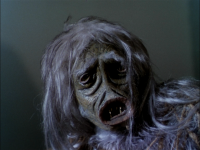
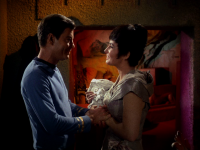
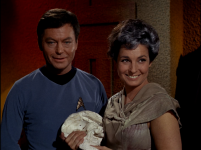
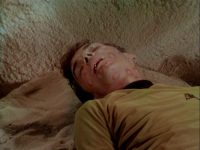
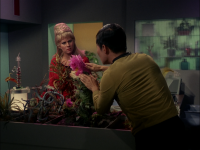
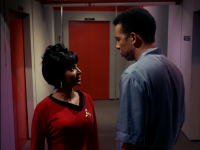
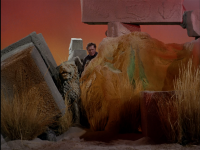

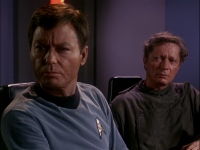
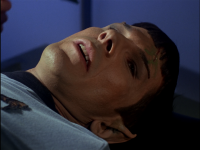
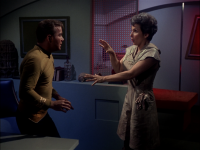
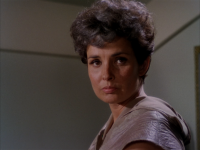
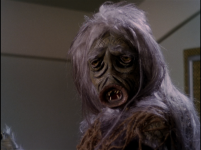
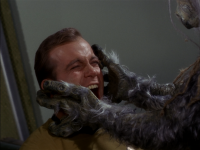

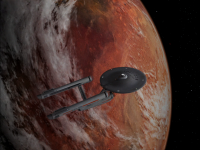
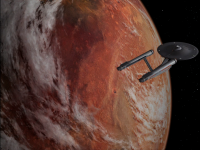
Star Trek TOS - 1x01 - The Man Trap
Originally Aired: 1966-9-8
Synopsis:
A shape-shifting, salt-craving creature terrorizes the crew of Enterprise. [Blu-ray] [DVD]
Filler Quotient:
2, filler, but an enjoyable episode nevertheless. You can skip this one, but you'd miss out on some fun.
- There's no essential plot or exposition in this episode that renders it unskippable, but it's a decent episode, if a bit slow.
Problems
- In Nancy's first scene she walks onto the set singing before being startled to see McCoy. While she's singing, you can clearly see that her lips are not moving.
Factoids
- This was the first episode of Star Trek to air on national television. The true pilot, The Cage, was never aired during the show's original run.
- Vulcan has no moon according to Spock in this episode.
- The "great bird of the galaxy" Sulu referred to in this episode is actually a reference to a nickname given to Gene Roddenberry by the production staff.
- This episode establishes that Buffalo on Earth are extinct at this time.
- This is the first episode to depict Vulcans' green blood.
Remarkable Scenes
- McCoy and Kirk arguing over how young McCoy's old girlfriend looks.
- McCoy: "He's dead, Jim." Count 1.
- Uhura toying with Spock.
- Kirk yelling at McCoy for changing the subject to his old girlfriend again just after discussing the dead crewman.
- McCoy and Kirk needling Crater for information concerning the connection between his desire for salt and the crewman's death.
- Sulu: "May the great bird of the galaxy bless your planet."
- Kirk and Spock coordinating a stun attack on Crater.
- Crater and "McCoy" trying to defend the salt monster's right to live.
My Review
A considerable time since the events of The Cage, The Man Trap introduces us to a brand new cast and crew of The Enterprise with Mr. Spock being the only recognizable character retained since Captain Pike's days. Captain Kirk now commands the Enterprise and Leonard McCoy is now the chief medical officer. Other new and notable characters include communications officer Uhura, ship's pilot Sulu, and yeoman Rand, who all do quite a nice job of rounding out the cast.
It's important to note that since The Cage never aired until after Star Trek was canceled, The Man Trap is the first episode of Star Trek that original audiences ever saw. As such, the universe of Star Trek is first introduced here. Much like The Cage, The Man Trap depicts a highly technologically advanced future for Earth where presumably ships like The Enterprise roam the galaxy both exploring new space and resupplying and otherwise assisting Earth's various colonies.
As evidenced by Mr. Spock, some aliens even live amongst the humans, however their citizenship status remains unclear. At this point, it's not made clear whether or not Earth exists as a nation or if Earth is just a member state in a much larger nation. Not all aliens are benign, friendly allies like Mr. Spock though, as the salt monster clearly indicates.
Framing the salt monster as an endangered species that should be protected was a particularly clever way to enhance what is, frankly, a meager plot. Right from the beginning we know that Nancy is not all she appears to be, and it doesn't take too much longer for her odd preoccupation with salt to become obvious not just to the audience, but to our heroes as well. Because of this, the plot seems to drag on at a painfully slow pace, what with four extras dying and even Crater dying before Kirk figures out what's going on.
Despite that though there are certainly some nice touches even beyond the endangered species commentary. I liked Kirk's and Spock's coordinated non-lethal attack on Crater along with the attention to detail concerning Spock's alien anatomy. The salt monster itself, once its true form was revealed at the end of the episode, was an impressive costume as well despite it being simply a guy in a rubber suit. Overall The Man Trap is an effective story, but it could have been better if it had a subplot; especially one that focused more on exposition about Earth, the Enterprise, and the nature of their mission.
The following are comments submitted by my readers.
- From Orion Pimpdaddy on 2007-11-27 at 5:53pm:
I rated this episode a 4. The pacing is too slow, especially in the second half of the episode. You feel like your watching it in slow-mo. One plus is that the dialog between Kirk and Bones is emotional and passionate. - From rpeh on 2010-06-22 at 10:00pm:
While it's true that this episode is a bit slow, it has to be. Remember this was the one that had to introduce a whole new show, so there was bound to be a bit of an introduction to people, what they could do, where they came from and so on.
The mistake here is that the alien is revealed to the viewer within the first... 3 minutes. We then end up waiting for the crew to catch up with what the audience knows. Later episodes worked out how to do this much better.
I'm writing this 44 years after the program was first broadcast, and it's still watchable. That can't be a bad start! - From CAlexander on 2011-03-26 at 11:17pm:
I just rewatched this episode, and thought it was quite good up until the final confrontation. Of course this was the first episode shown, but after watching so many other Star Treks there is something a bit refreshing about this monster. In your typical TNG episode the monster is some unstoppable menace that requires a brilliant plan or new invention to defeat. The salt vampire really isn't so overblown. It never seriously threatens to destroy the Enterprise. It is enough for purposes of the story that a killer is on the loose, and Kirk has to stop it.
Monster stories usually involve a lot of foolishness by the crew, but in this case I thought everyone reacted fairly logically, given that they think this is a routine checkup (except for the usual question of why the bridge crew has to do everything for themselves). The first death triggers an immediate investigation. Once Kirk sees the second death, he stops messing around and nobody dies on the planet after that (it just takes them a while to find the third death). Once he finds crewman Green's body, he immediately alerts the ship. The fourth death has basically already happened by this point. The ship goes on security alert, and for once it actually works, no more deaths after this point.
Rewatching the episode, I watched the salt vampire's behavior rather carefully, and its behavior is very interesting. It basically relies on its empathic powers to try to fit in, but it is confused and not very intelligent. It just sort of reacts to what is happening and tries to fit in and find salt, but it is basically certain to get caught. It is not a deadly, super-cunning alien menace, but a confused, hungry creature which must be stopped before it kills again. The episode is more interesting too when you try to figure out what the monster is thinking, since the pace certainly is a bit slow.
As for the professor's motives – well, he's lost his mind, he's capable of anything.
The final confrontation is not so great for me, it seems way overdramatized. Also, as has been mentioned in other forums, the total lack of any attempt to avoid killing the creature doesn't seem consistent with the idealistic philosophy of later Star Trek episodes. Well, maybe Starfleet regretted the incident and instituted new regulations to prevent it from happening again. Maybe Kirk was thinking of this incident when he later spared the Horta.
Problems:
- Kirk makes a log entry about armed men not being caught off guard unless the creature has hypnotic or paralyzing powers. Not only is this inference unwarranted, this is before he realizes that there is a creature at all, rather than some other cause of death (disease, chemicals, radiation, plants, whatever). But he doesn't seem to be making the entry at the time we hear it (we see him searching the planet), so he must have made it afterwards, and his memories were colored by his later knowledge.
- From Alan Feldman on 2011-11-14 at 1:18am:
Remarkable scenes:
At the beginning (starting at about 47s), Kirk grabs some "flowers" for Nancy. Huh? Those are not flowers. They're more like straw.
Guys, try handing these "flowers" to your honey and see what happens!
At the end of the episode (in the scene starting at 44m31s), Spock is repeatedly smacking Nancy hard -- full force, even! -- with a swinging two-handed fist right in her face! Is this not remarkable? (Yes, I know. It's "really" the salt monster. Still.) The whole scene from Nancy entering the room as Dr. McCoy to the shot of the dead salt monster on the floor is truly remarkable, I'd say. Very well done.
Problems:
Even the smacking scene above has problems. Watch the salt tablets go flying out of Kirk's hand onto the floor! I wonder if even a single tablet was caught by "Nancy." Still a great scene.
Bad:
Scenes with Yeoman Rand. The "flower" in the scene with her, Sulu, and Green is so obviously a hand in a glove it's just ridiculous.
Notable:
It's amazing how Shatner, Nimoy, and Kelly got into character so fast at the beginning of the series.
AEF - From Mike Meares on 2012-01-22 at 9:57pm:
I totally agree with what has been written here about Man Trap. The story could have been stronger.
However, I must say that this episode really keeps me interested the whole time. And I think it is because there is a lot of background development of several crew members, which I think is lacking in a lot of episodes.
You learn so much about the thoughts and feelings of Dr. McCoy, Sulu, Uhura and Rand. And that is so great. I only wish this kind of thing was developed a lot more with the rest of the crew over the years, but alas it was not. A real shame too because good character makes the story so much more interesting. - From Strider on 2012-08-29 at 3:59am:
I guess I understand why they aired this one first, but I wish they hadn't. This should be the 6th episode, not the first. The relationships are much more solidified than you'd expect in the very beginning--and, indeed, more developed than they are in Where No Man Has Gone Before and The Corbomite Maneuver. Airing them out of order makes it seem like they are backtracking in character development and relationships. - From Alan Feldman on 2012-09-09 at 7:31pm:
More comments on "The Man Trap":
Kirk's opening narration is somewhat subdued. He speaks softly.
The planet is rotating too quickly. (Not unusual!)
Transitions of Nancy into others, etc., are mostly well done.
Isn't it a bit weird that the transitions of the monster include clothing? How does that work?
I agree with Kethinov that the salt monster costume is pretty good. But I think the pace is okay most of the time. I like seeing Kirk and Spock slowly figuring out what's going on as they accumulate clues.
Why does Kirk scream out for Green? Why doesn't he use his communicator? Must be a communicator breakdown. Or maybe Green left his on the ship.
What? No bedsheets or even a blanket for McCoy when he's trying to get some shut-eye? No wonder he needs the red pills! (!)
When Crater shoots down the pillar at 34:20 I think it looks quite good! Even with the frame frozen you can see the phaser beam strike right at the center of the explosion. It's well timed, too. Well done! But I don't understand why the camera rocks left and right. Regardless, it looks pretty good.
When Spock yells to Crater, Crater looks the wrong way! Spock is on the right and Crater looks to screen left. But the actual shot of him getting stunned is well done.
AEF - From Glenn239 on 2012-10-16 at 1:51pm:
‘7’. One of the interesting features of this episode is that it shows how quickly Gene Roddenberry’s Star Trek evolved from the concepts in the pilot episode into a more ‘final’ form. Every decision – casting, characters, uniforms, equipment, etc – looks like a step in the right direction to me. The fact that this episode was shown out of order indicates that the network either felt it was a better representation of what the show was to be about, or perhaps wanted a plot an average viewer would connect with for debut. Another bonus is that the Enterprise is not saving the Enterprise or the Earth this time. Well, there will always be plenty of time to do that later in Star Trek, oh about 175 times.
The creature itself, as a shape-shifter that takes on a form pleasing to its victim, resembles a little one of the later Night Stalker episodes - I've always been a sucker for that theme. On the sly, the episode also seems to be a bit of a satirical look at women in relationships or marriage.
- From Schreck on 2013-05-23 at 6:56am:
an uninspiring episode...i give it a 6.5 and my brother gives it a 6.25 - From Scott G. Slaughter on 2013-07-05 at 10:16pm:
The Antares is variously referred to as a cargo ship, transport ship, a science probe vessel and a survey ship. That's a problem in the episode, if you ask me. - From Pat on 2015-11-09 at 6:44pm:
I have always wondered about this episode. Instead of killing the creature, why didn't they just replicate salt? - From star Bird on 2022-11-18 at 12:51am:
Dont let them get their mits on you
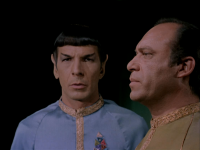
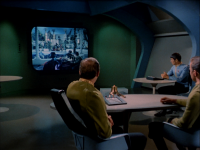
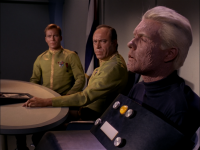
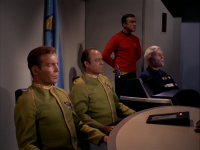
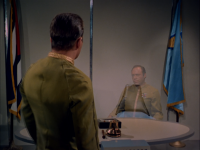
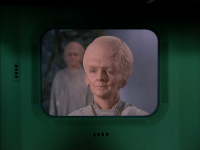
Star Trek TOS - 1x12 - The Menagerie, Part II
Originally Aired: 1966-11-24
Synopsis:
Spock hijacks the Enterprise to return an injured Captain Pike to Talos IV. [Blu-ray] [DVD]
Filler Quotient:
2, filler, but an enjoyable episode nevertheless. You can skip this one, but you'd miss out on some fun.
- Neither the first, nor the second part of The Menagerie is essential viewing if you're trying to plow through only Star Trek's essential exposition and stand-out classics, but it's definitely among the better episodes. If you do decide to watch The Menagerie, I recommend skipping The Cage unless you're willing to put up with the clip show to get the additional texture.
Problems
- This episode unfortunately inherits many continuity errors due to reusing material from The Cage. See my review of The Cage for a complete list of them.
Factoids
- This episode (both parts) won the 1967 Hugo Award for Best Dramatic Presentation.
Remarkable Scenes
- The revelation that the commodore was an illusion.
- The Talosians welcoming Pike back to their world.
My Review
The pacing of part two crashes hard. Even if you opted out of seeing The Cage prior to watching The Menagerie, the plot still seems to spend a conspicuous amount of time making excuses to put as much of Pike's flashback experiences with the Talosians on screen as possible. At one point Spock is even asked why he doesn't just explain to the court what he's trying to demonstrate and his absurd response was that they wouldn't believe him if he simply explained it, so he has to show it instead. The court then proceeds to make a unanimous vote finding Spock guilty, a redundant action seeing as how he already entered a plea of guilty in part one, at which point despite having both admitted his guilt and having been found guilty by the panel of judges, Spock astonishingly continues to be allowed to present testimony.
All of this nonsense gets justified at the end by the rather meager excuse that Spock and the Talosians were working together to create delays, including the illusion of the commodore's presence aboard the ship, so that Kirk would not attempt to regain control of the ship in time for it to arrive at Talos IV. Using the Talosians' power of illusions to misdirect Kirk was a reasonably good idea for a plot point, but hinging the entire second part of the episode on misdirecting the audience as much as Kirk (annoying the audience in the process) all so the episode could get away with having as little plot as possible was pretty weak.
What's worse is we learn that the whole reason why Talos IV is a forbidden world is because the government bought into the Talosians' absurd fear that establishing some kind of normal trade relations would result in their power of illusions spreading, destroying others as they've destroyed themselves. This fear is a shoddy justification for barring any travel to or communication with Talos IV and an even worse justification for enforcing such a nonsensical law by enacting the death penalty. I was hoping for some new exposition that might at least attempt to give some rational reason for the existence of such a draconian law, but the episode didn't even really bother. What points I grant this episode are mostly riding on the well executed dramatic premise and potential of part one, which part two satisfactorily concluded, but largely failed to do justice to.
The following are comments submitted by my readers.
- From jaylong on 2007-10-09 at 4:12am:
not really a review. but for people who stumble upon this, how do you guys feel about these two episodes being chosen to be remastered and released into the theatre?
i really think they could have chosen a better two episodes, but i'm down.
here's the info if you've been under a rock;
http://www.fathomevents.com//details.aspx?eventid=685
"An in-theatre exclusive greeting from creator Gene Roddenberry’s son, Eugene “Rod” Roddenberry is included, as well as a behind-the-scenes look at how the episodes were digitally re-mastered from the original negatives – including the reinvention of the old TV show special effects using new CGI animation, and the orchestral re-recording of the show’s theme music."
Nice, new CG? I hope Jar Jar isn't in it... - From Orion Pimpdaddy on 2007-10-12 at 2:55pm:
Yeah, I can't wait to see this episode in the theatre. I kind of wish they would show a couple of other epidoes instead, but this episode is still classic. - From rhea on 2008-04-27 at 5:37pm:
Not a full review, just two additions to yours, which I agree with, especially when it comes to the blatant absurdities. Overall, I still enjoyed the episode very much for the thorough character portraits it gave us.
- an additonal problem: I do not understand how Spock could get off the hook this easily. This is a military organisation, and insubordination is a major crime, whatever the reason. Now, if a commanding officer is unable to perform his duty, then mutiny should of course be accepted, but compassion is usually not a reason for the military to spare someone a court martial and/or punish them. Not credible, now way.
- an additional highlight: Kirk. This is one of the very very few times we see Kirk in full military commander mode: calm, cool, deadly, convicting a friend to death because this is what his duty demands of him. Usually, he is all buddy with his crew and very angry/emotional or con-manish with his enemies, but hardly ever the hardass officer who can send a man to his death if he has to. Now we know why he got command of a vessel with 400+ crewmembers. It's powerful, and very well acted out by Shatner. - From CAlexander on 2011-04-15 at 6:04pm:
I love the Cage, but to the extent that the Menagerie is considered separately from the Cage, I am not fond of it. I find it to be a rather forced framing device to re-show the Cage. Everything about the trial is artificial. In particular, the concept that Spock risks the only remaining death penalty on the books is just ridiculous, a totally unnecessary attempt to pump up the drama. Really, Spock risking his career would be quite bad enough. - From menagerie on 2011-08-21 at 7:25pm:
I agree that the second part largely lacked plot or original exposition, and at times made me feel as if I was re-watching "The Cage." But I disagree that any of it is very absurd or particularly annoying.
I don't think it's fair to criticize the episode for "misdirecting" the audience. Something like 25 - 50% of all of Star Trek seems to be "misdirection" - arguably, that's the best part. In any case, it's almost universally used towards good dramatic effect, and this episode really isn't any different.
First of, the trial and it's semi-absurdity is explained quite well by the context and the Talosian involvement, including of course the fabricated commodore. And Kirk was going along with it and glossing over its absurdity because he was captivated by the story and wanted to know the truth.
There's some question about whether it was necessary in the first place, but to give the show credit, Kirk asks that question outright! And it does make a certain amount of sense. Would Kirk otherwise disobey Starfleet orders, risk court martial (and even execution), to assist Spock in helping Pike? Someone he deeply respects, for sure, but has almost no personal history with? To clinch the whole matter, we have to remember that Pike was initially opposed to the whole thing! The trial and the recap was as much to convince Pike as to convince Kirk as to convince us, the audience. In my eyes, it makes sense, and is done well (although I do agree that the sheer amount of reused footage starts to feel a bit contrived and was perhaps a bit much).
So we are left with the final criticism. Why the travel and communication ban? Why enforce it with the death penalty? I think it makes sense if you consider it. There's more than just the face-value reasons, the threat of Humanity developing "the power of illusion" and meeting the same fate as the Talosians.
Consider also the sheer power represented by the Talosians. A handful of these folks (perhaps even one) took complete control of a Starfleet flagship, and outmaneuvered its entire crew, its first officer, and its captain. Even at the very end, after Pike escaped from his menagerie, he had no way to get back onto the ship. They were completely at the mercy of the Talosians - the only card they had to play was committing suicide.
It's safe to guess that this is the most powerful species Starfleet has ever encountered. Sure they proved "too intelligent to kill for no reason," and quite reasonable and benevolent even, but wouldn't it be prudent to stay clear of something so completely out of your league? Especially when they have a history of treating humans as we treat "lower" animals? And even if they were benevolent, what if some renegade captain, or crazed scientist, or even a random stowaway or something learned how to replicate their powers? The threat would potentially be worse than a WMD going on the black market.
Compound all that with the one explicitly suggested reason, the hypothetical danger of "the Keeper's" prophecy - that we would all become as helpless and on the verge of extinction as they - and the draconian ban begins to make some sense.
Facing something of nearly limitless power, something they could not even begin to understand or control, in the hands of mysterious beings on a mysterious planet, fleet command decided to, for the time being, just strike the whole matter from the record, classify the whole thing - so no one gets either too freaked out or too curious - delete Talos from the map, and forbid all contact. It shows prudence, and it makes some sense.
So, in conclusion, I think this two-parter is fantastic - I concur with the reviewers compliments, and even disagree with some of his critiques. - From Wiley Hyena on 2012-05-12 at 4:38pm:
This is one of the site's most inaccurate review ratings. Menagerie II is one of the best, if not the best, episodes in all of Star Trek. The reunion of Pike and the girl, beginning with Pike's wish to go, is great drama. - From Schreck on 2013-05-23 at 10:17pm:
I did not like the second part nearly as much as the first…it could have something to do with the constant rehashing of The Cage…I give it a 6.25 and my brother a 7…Our average ratings for the two parts are a 6.63 for myself and a 6.75 for my brother - From Stewart Snider on 2019-03-05 at 11:11pm:
I was around when this aired in 1966. At age 12, I was puzzled where the old footage came from. It wasn't public knowledge then that The Cage was the original passed-on pilot, so I just assumed they shot it for this episode. This didn't look like a 13-years-older Enterprise and it didn't make sense for Spock to be emotional. These, along with all the other plot problems mentioned here still did not keep me from being mesmerized by the other-worldliness of this episode. Kirk's final look at the Talosian Keeper conveyed how I felt.
One thing I haven't seen mentioned here: I think the actors knew there were huge problems with most of the stories, and just took it on themselves to make their performances so good that viewers would want to watch anyway. I'm in awe of them, for this reason. Even though I think Shatner is a narcissistic ass.
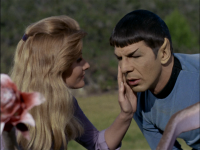
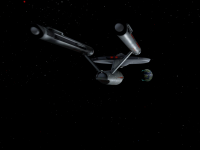
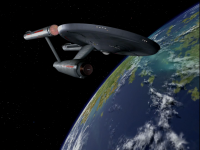
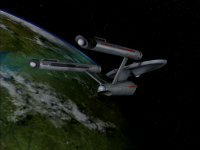
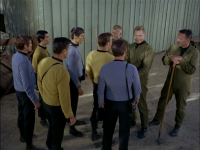
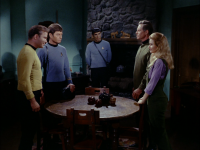
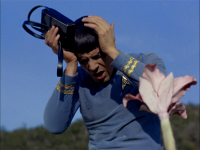
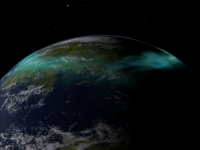
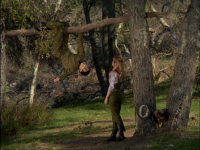
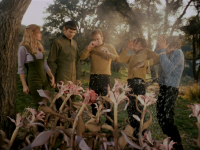
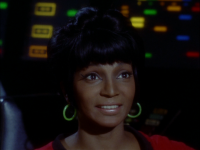
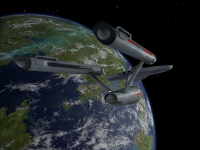
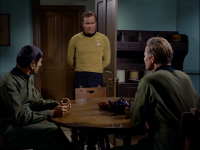
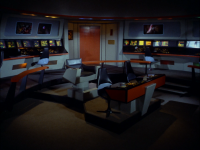
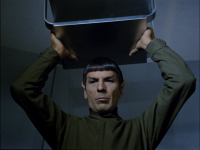
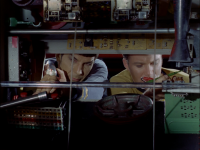

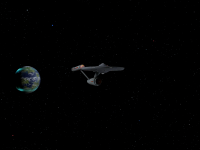
Star Trek TOS - 1x24 - This Side of Paradise
Originally Aired: 1967-3-2
Synopsis:
The Enterprise visits a colony where indigenous flower spores provide the settlers with peaceful contentment. [Blu-ray] [DVD]
Filler Quotient:
3, bad filler, totally skippable.
- Pretty lame episode with no significant long term continuity.
Problems
- Vulcans are inexplicably referred to as "Vulcanians" in this episode.
- Who beamed up Kirk when he returned to the ship to find it deserted?
Factoids
- When asked for his full name by Leila, Spock answers, "you couldn't pronounce it." This implies that all Vulcans do indeed have multipart names like humans, but casually shorten their names so that other species can interact with them.
- According to Spock, his mother was a teacher. His father was an ambassador.
Remarkable Scenes
- Spock hanging from a tree.
- Kirk getting irritated at all the infected crewmen.
- Kirk alone on the bridge.
- Kirk insulting Spock.
- Kirk: "Maybe we weren't meant for paradise. Maybe we were meant to fight our way through, struggle, claw our way up, scratch for every inch of the way. Maybe we can't stroll to the music of the lute; we must march to the sound of drums."
- Spock: "For the first time in my life I was happy."
My Review
Much like The Return of the Archons, the pacing of this episode is mind numbingly slow. It takes twenty minutes for the story to finally get to the point which is (for the most part) the emotional unraveling of Spock. Once Spock's emotional control is finally destabilized, we get a reasonably amusing story which explores Leila's unrequited love for Spock and Spock's secret desires to explore his humanity. Unfortunately these themes are not explored in much depth though because the story focuses mostly on the silly mutiny aboard the Enterprise. While Kirk does an excellent job dealing with the silly mutiny in a professional and innovative fashion, the mutiny wasn't a terribly interesting plot thread to begin with.
Another one of the episode's missteps was the overwrought capabilities of the flower drug in the first place. By the end of the story we learn that consumption of the flower spores can not only insulate people from deadly radiation, but that it can also vastly improve physical health, an effect which McCoy even mentions is permanent in the final scene. For that reason alone these flowers should be harvested and studied for their medicinal use, but no serious mention is ever made of their incredible scientific potential. They are instead only regarded as a pest for their mutinous side effects. Once again a Star Trek episode fails to thoroughly think through the implications of a plot device.
Overall the episode is mildly entertaining. If you can sit through the first twenty minutes without getting too terribly bored (which is challenging), it can be a lot of fun to watch the main cast run around doing crazy things once they all get infected. The story also offers some decent character development for Kirk as well as Spock. A better episode however would have limited the scope of emotional destabilizations just to Spock for the sole purpose of exploring his constant struggle with emotions due to his "half-breed" nature. We got a taste of how good a story that could be in both this episode as well as previously in The Naked Time and I believe a story focused solely on that would be a superior piece.
The following are comments submitted by my readers.
- From Orion Pimpdaddy on 2007-12-14 at 6:54pm:
I truly think this episode deserves a 10. Am I crazy? Well, I just think that almost every moment is entertaining. The moments that stick out the most are:
-Spock daying “I don’t think so, sir.”
-Spock hanging from a tree and looking playful
-Kirk making Spock angry. This part has some of the most funniest dialogue in the franchise! Your father was a computer, and your mother was a librarian. You should be squatting on a mushroom. Classic!
-Kirk walking around an empty ship. They writers actually allow Kirk to reflect on it.
-Dr. McCoy starting a fight
-Spock’s love story, which is done very well.
I think this episode also has a meaningful lesson: A society in paradise cannot advance itself.
To top is off, there’s a great, grim line from Spock that ends the episode, as opposed to the cheerful jokes that often end TOS episodes.
Great episode!
- From tony on 2009-01-17 at 2:33am:
When Kirk beamed back up, there were many crewmen left. In fact, he ordered some back to their station. - From Orion Pimpdaddy on 2009-10-27 at 8:18pm:
I just watched this again on Blu-Ray, and I still love it. The picture quality has been upgraded dramatically. Specifically, there are many scenes that take place outside in the sunshine, which shows off the high contrast of HD. - From Alan Feldman on 2014-07-04 at 3:53am:
"This Side of Paradise" or "The Amish on Drugs, but without a religion"
Re the problems you mention:
Vulcans and Vulcanians. Just like Australians and Aussies, Dutch and Netherlanders, New Jerseyans and New Jerseyites, or Brits and Britons, etc. No biggie. Several states in the U.S. have multiple names for their residents (see http://en.wikipedia.org/wiki/List_of_demonyms_for_U.S._states ). Some countries do, too. BTW, I do prefer "Vulcan," but I can go with Vulcanian. Adds some variety and spice, if you like.
"Who beamed up Kirk?" When Kirk returns to "an empty ship," there must have still been a few remaining to beam down. There's nothing I see in the episode that's inconsistent with this. In fact, just before he goes back, Spock says, "Almost the entire ship's complement has beamed down." So Kirk could still get back up to the ship. Once he reaches the bridge, _then_ the very last of his crew leave the ship.
>----o----<
I think the first 20 minutes is fine. Spock is already infected halfway through the 16th minute. Think of it as "the first fifty pages" of a novel, if you have to.
Hey, for once the planet isn't rotating way too fast! In fact, it looks like it's not rotating at all, which is how it would really look. Bravo!
A fun episode, but as usual, there are some problems.
>----o----<
This is paradise? Working the fields? Not _my_ idea of paradise! If you ask me, in "paradise," _someone else_ works the fields, _someone else_ does the dishes. OK, to be fair to all involved we'd need to make robots to do all the grunge work. I suppose that's the trouble with paradise: somebody somewhere has to pay for it. Even the berthold rays can't do everything. And what about entertainment? Ah, the spores numb you from the awfulness of boredom.
And they also give you perfect health! But can they regrow an amputated limb? That would be pretty good! --- Yes, it'd be cool to use it as the all-purpose cure. You get sprayed by the spores, then use strong or violent emotions to return to normal. (Pretty bizarre cure.) But it doesn't ruin the point of the story.
Oh, another thing that would help make a place paradise is a perpetual motion machine. Yeah, good luck making one!
What about plumbing, and all such related matters? Could get pretty messy. And what about other basic supplies? This is paradise?
>----o----<
Where do the berthold rays come from? I don't think it was ever said. They were just there. It _was_ said that they were a "recent discovery." Still.
"Is it possible that they're not [alive]?" asks Sulu. Say what?
They grow only enough food for themselves. Well, that's bad if there's a famine (unless you include that in the calculation). Aside from that, whom else should they be growing food for? Did they travel there to start a business?
Why does Star Fleet insist on a forced evacuation due to the danger of the berthold rays? It's pretty damn obvious that after three years, the colonists' superb health shows that they're not in any danger. (Of course it'd be less of a story without the orders for an evacuation.) And why should they leave if they don't want to, anyway? They're self-sufficient and happy, even if boring, stagnant, and unproductive. And they're not bothering anyone. Leave 'em alone. OTOH, they apparently didn't want that life once they were forced off the spores. (Well, except for Leila, who apparently wanted Spock at all costs.) Could go either way, I guess. Additionally, who the hell is Star Fleet to order them around, anyway?
Lots of fun stuff, esp. with Spock, as has been pointed out by others. Most of the scenes with Spock high are terrific. It's always a blast when he smiles so much! Fortunately it's quite rare, so as to not ruin the effect. The only other episodes I can think of offhand with Spock smiling big-time are "The Menagerie" (yes, "The Cage" part) and "Plato's Stepchildren". Oh, and "Where No Man Has Gone Before".
McCoy definitely sounds high on the spores. Sort of like a drunken (for lack of a better word) happiness, but still mostly in control of himself. He must have had a strong dose!
How is it that when Sulu and the blue-shirt were sprayed by the flower, not even one spore landed on Kirk, even though he was right next to Sulu, whose chest got covered by plenty of them?! OK, he was maybe few inches back. Still. But since it was obviously intentional, it was well done. The spores only hit Sulu and the blue-shirt. I wonder how many takes it took.
Notice that the plant that did get Kirk, wasn't there in the scenes just prior. Perhaps overlooked, or maybe there just wasn't enough time to redo the scenes due to the tight shooting schedule. And the plant picks itself up to shoot at Kirk!
I loved it when Uhura turned around in the seat all glowing with some kind of high: "Oh, I'm sorry, Captain. I can't do that," and with just the right music to set the mood. Pretty good.
I love the scene where McCoy gets hostile with Sandoval.
Why does the subsonic transmitter make that obnoxious noise on the ship? (Speaking of which, tricorders also make an annoying noise.) I'm almost amazed they didn't have some "audible" subsonic sound down on the planet. But I am glad they didn't. And via what communicator are they broadcasting these subsonic sounds? How does that work?
"We wanted to make this planet a garden," Sandoval says. This is the big goal? To make the planet a garden? I see. Travel dozens of light years or more to some strange planet to make it a garden. Some goal. Maybe I'm missing something here.
The scene with Kirk goading Spock into a fight was pretty good!
Isn't Spock visibly concerned with letting down Leila at the end? Isn't that emotion? Isn't there just that slight smile on his face when he says, "You couldn't pronounce it"?
Speaking of Leila, I think Jill Ireland did a great job as her.
That "sweet" flute music is used several times. It works best at the end when Spock says, "I have little to say about it, Captain, except that for the first time in my life, I was happy." What motivates him the rest of the time? Logic doesn't provide a goal; it just helps you get there.
I'd definitely rate this episode higher than 3. Certainly at least a 6. Perhaps a 7 or an 8. There's definitely lots of great stuff in this episode!
AEF, aka betaneptune - From Stewart Snider on 2019-03-06 at 12:33am:
Seeing Spock in love caused me to forgive all the plot contrivances here. Kirk's loneliness on the bridge was compelling as well.
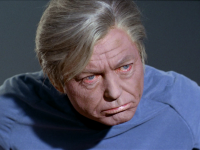
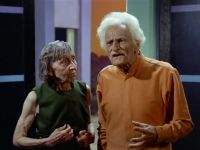
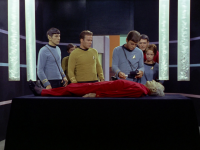
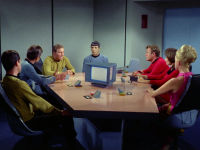
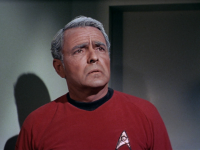
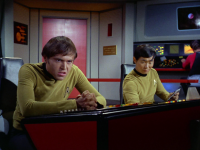
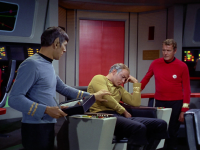
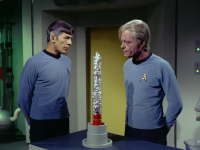
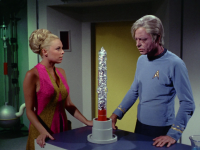
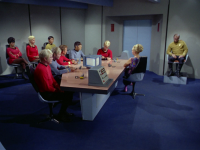
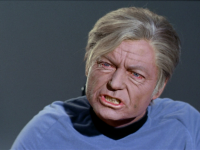
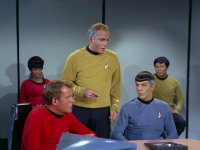
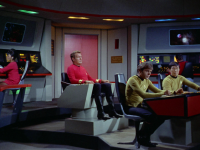
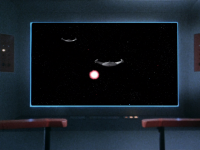
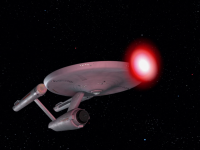
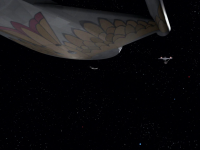
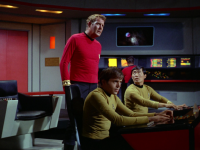
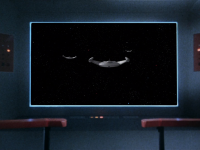
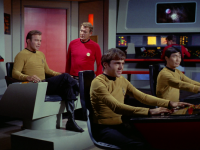
Star Trek TOS - 2x12 - The Deadly Years
Originally Aired: 1967-12-8
Synopsis:
Accelerated aging affects the senior officers and threatens Kirk's ability to lead. [Blu-ray] [DVD]
Filler Quotient:
3, bad filler, totally skippable.
- Pretty lame episode with no significant long term continuity.
Problems
- As Kirk ages, his hairline begins to recede. Then when he gets even older, his hairline advances again!
Factoids
- Kirk is stated to be 34 years old in this episode.
Remarkable Scenes
- Kirk: "Maintain standard orbit, Mr. Sulu." Sulu: "You already gave that command, sir." Kirk: "Oh? Well, follow it!"
- Chekov moaning about his medical adventures: "Give us some more blood, Chekov. The needle won't hurt, Chekov. Take off your shirt, Chekov. Roll over, Chekov. Breathe deeply, Chekov. Blood sample, Chekov. Marrow sample, Chekov. Skin sample, Chekov. If I live long enough, I'm going to run out of samples!"
- Kirk's senile behavior.
- McCoy: "I'm not a magician, Spock, just an old country doctor!" (Count #7 for "I'm a doctor, not a [blah]" style lines McCoy is famous for.)
- Commodore Stocker calling for a competency hearing against Kirk.
- The space battle with the Romulans.
- Kirk pulling the Corbomite maneuver.
My Review
A reasonably entertaining story mired by lousy science and faulty plot logic. Simply stated, a disease which causes the aging process to accelerate should be regarded as irreversibly terminal even in the fantastical Star Trek universe because McCoy's miracle cure is nothing short of a reversal of the aging process itself! To rationalize the story we have to make up a bunch of nonsense about how McCoy's miracle cure can only reverse artificial aging induced by the evil comet's radiation, so as to avoid the implications of the idea that McCoy has found some sort of anti-aging miracle drug. On top of that, the very idea that a mere injection could somehow reverse any kind of radiation damage in the first place is absurd to begin with, much less reversing the aging process itself.
Though I suppose if we assume that the Federation has access to cell damage reversal drugs beyond the wildest imagination of what science tells us is realistic technological advancement and we assume that the artificial aging induced by the comet is a somehow different and more innately reversible form of cell damage, then I suppose the science in this episode could be considered workable. However, if you've forced your audience to go into that level of depth to rationalize the events of your story, then you haven't written a very good story.
In addition to the science errors there are a number of wrinkles in the basic storytelling as well. For instance, why is Dr. Janet Wallace even aboard the ship? It's never once mentioned just what the hell she's even doing there. And why did we spend so much time on a competency hearing for Kirk in the middle of a crisis situation? Since he quite literally aged years waiting for the hearing to end, I had some sympathy for him when he condemned the procedures, regarding them as "the most fool thing I ever heard of. Competency hearing when there's work to be done!" Then finally there's the painfully absurd moment when Commodore Stocker orders the ship through the Neutral Zone despite Sulu's warning for completely no reason.
All that adds up to quite a stinker of a story for the most part, but there are charming aspects as well which render this one of the better picks of the bad episodes. The reuse of the Romulans as antagonists was a nice choice; especially the detail that we never actually see them face to face, in keeping with their tendency for a rather reserved and distant characterization as previously established in Balance of Terror. Another nice touch was Commodore Stocker's personality in general. Despite his completely boneheaded Neutral Zone mistake, he was a generally likable incompetent-Federation-bureaucrat-of-the-week, unlike most of the rest. Finally the reuse of the Corbomite Maneuver was a nice nod to the fans. All in all though this was a story with a lot of wasted potential.
The following are comments submitted by my readers.
- From Orion Pimpdaddy on 2010-05-11 at 8:45pm:
I often cringe when I have to watch an episode of Trek where the crew catches a disease that causes them to grow old. Almost every series had at least one episode where this happens. However, when I start watching The Deadly Years, I realize that it's really not that bad of an episode. It's cool how different members of the landing party age at different rates. I also think they did a great job with the makeup, given the budget of the show. The "trial" DOES seem to slow down the plot a lot, and I wish they would have skipped it altogether. Overall thought, I enjoyed this episode. - From Wiley Hyena on 2012-05-13 at 1:22am:
Reviewer missed the mark here. This episode is one of the funniest Trek episodes of all. McCoy stole the show. Give it a 7. - From Glenn239 on 2012-10-05 at 1:46pm:
Quote: “As Kirk ages, his hairline begins to recede. Then when he gets even older, his hairline advances again!”
Well, in all fairness to the makeup department, that’s pretty much what happened in real life too.
- From Alan Feldman on 2012-10-13 at 6:08pm:
"The Deadly Years"
At about 22m39s Spock tells McCoy that "the ship's temperature is increasingly uncomfortable for [him]" and that he's adjusted the temperature of his quarters to 125 deg., "which is at least tolerable". But he's standing right there where the temperature is normal without so much as a sweater and seems to be all right! Then he asks McCoy if there's something that would lower his sensitivity to cold. How about a parka? A great dialog exchange in that scene, though. And what's that 2 or 2 1/2-foot tall thing on the table?
I thought the aging-makeup was pretty good!
Yeah, the story's not all that sensible, so you watch this episode primarily for the "remarkable scenes".
In reply to Kethinov's question: Commodore Stocker ordered the ship to go through the Neutral Zone because he was in a hurry to save the crew before they aged to death. Time was of the essence. Still a rather risky move*, but it enables us to get the great rescue by the rejuvenated Captain Kirk at the end. Speaking of which, why do the Romulans suddenly stop firing when he arrives on the bridge? Also, why didn't Commodore Stocker at least shoot back?
* Recall that the Enterprise spent a considerable amount of time in Romulan space in "The Way to Eden" and weren't confronted by any Romulans, so it seems reasonable that there is at least _some_ chance they could take a short cut through the Neutral Zone and emerge unscathed.
Notice that Chekov is wearing his wig in the last shot! You can see his sideburn is covered by it. Maybe it's recycled from another episode.
I think the remastered special effects are in general overrated. They often make the "science" even worse than in the original, as in the Doomsday Machine where the just-killed planet killer slowly tilts downward. In the original it just stayed put and actually simply looked dead, and was very well done, to boot. In this episode we have the fireballs flying at the Enterprise in arcs. Say what? Seeing the shields actually absorb/deflect direct hits in this episode was pretty cool, though. But we also have ships making bank turns as if they were flying through air. Also, wouldn't the Romulan fireballs be the same as the plasma balls that destroyed asteroids in "Balance of Terror"? If so, hardly something the Enterprise's shields could withstand.
AEF - From jd_juggler on 2015-03-23 at 3:06am:
Regarding the competency hearing; why wasn't Kirk permitted to have a lawyer, or any representation? A lawyer might have objected to pretty much all of Spock's questions as "leading". - From jd_juggler on 2015-03-24 at 4:55pm:
In this and many other episodes, the 20th century is referred to as "ancient history". That doesn't make sense; when we use the term today it usually means a few thousand years ago, not a few hundred years ago.
Kirk did not have a lawyer or advocate of any kind for his competency hearing. If he had a lawyer, no doubt there would be an objection to pretty much every question asked by Spock - they were all "leading" questions. - From Rick on 2015-04-11 at 3:06am:
jdjuggler,
Leading questions are allowed in cross-examination or in the questioning of adverse/hostile witnesses on direct. Your objection, as it were, is overruled. - From Kevin on 2017-03-14 at 3:20pm:
Entertaining, but full of plot holes. Again, most of the Senior officers go down to a planet. Are there not competent normal guys/girls on this huge ship that can do anything?
Okay the aging process, was kinda fun, and interesting, but wow, they were cured instantly and look like they just hit the make up trailer!! Like no signs that anything even happened.
I really liked the Commodore, he seemed to be a good actor and personality. Shame he was not used more, but how he basically just sat there after he was put in command was stretching credibility. He has literally "Zero" ideas. Shields up, get us out of here, Sulu do something...Anyone have ideas??? He could have said ANY of that and appeared at least credible.
As it is, he appeared to go from a pretty good actor, to a cardboard, "Deskbound clueless high ranking officer" that classic Star Trek uses way too often.
Overall, pretty entertaining, but a lot of issues. - From Chris on 2019-02-10 at 12:35am:
The biggest problem I have with this episode, other than a lot of the other complaints, is the rate of aging!
McCoy says it's approximately 30 years for each day! Yikes!
Kirk's already 34! He'll be 120 in three days? Dead, is more likely! Not to mention Scott, who is aging a lot faster! Galway already checked out!
Spock: "We have a little less than a week..." I'll say!
Dead, Deader, Deadest!
Trek always plays games with distances and times in episodes for dramatic effect but it never works and it's very irritating to me!
As far as Spock needing a parka, We learned during Spock's Brain that their uniforms control temp very well...

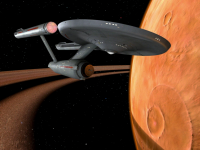
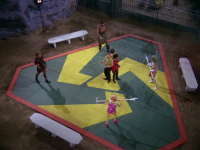
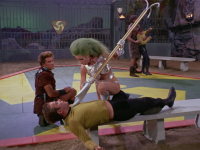
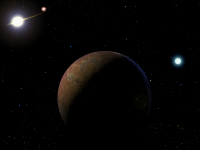
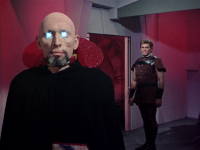
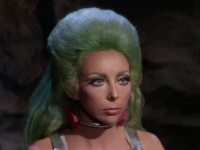
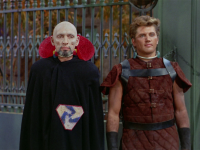
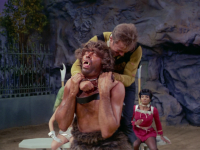
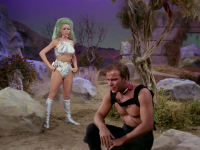
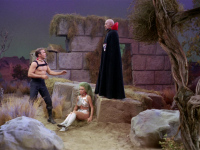
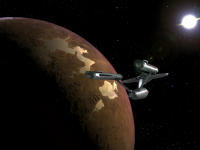
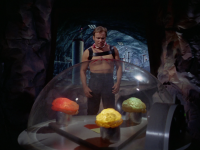
Star Trek TOS - 2x16 - The Gamesters of Triskelion
Originally Aired: 1968-1-5
Synopsis:
Three disembodied beings wager on fights staged by prisoners abducted from around the galaxy. [Blu-ray] [DVD]
Filler Quotient:
3, bad filler, totally skippable.
- Pretty lame episode with no significant long term continuity.
Problems
- At one point, Spock says that the landing party is "not within the confines of this solar system." This is a common error. The term they were looking for is planetary system. The planetary system we live in is called the Solar System because our star is named Sol. As such, the term "Solar System" is a proper noun, not a generic term.
- During the three against one fight, Kirk puts his entire foot on the opposing color several times with no penalty! I guess the slavers weren't quite as perceptive as they claimed.
Factoids
- The first draft of this episode featured Sulu instead of Chekov as part of the landing party. However, because George Takei was busy shooting his role in The Green Berets at the time this episode was being filmed, he could not return to the set of Star Trek to appear in this episode at all.
Remarkable Scenes
- McCoy badgering Spock during their search for the landing party.
- Kirk as target practice.
- The providers wagering on the newcomers.
- Shahna: "How can one live on a flicker of light?"
- Kirk: "A species that enslaves other beings is hardly superior, mentally or otherwise."
- Kirk's battle three against one.
My Review
A rehash of Arena. Once again the Enterprise's fate is decided by an unfair fight that Kirk must win for the crew to survive, complete with the plot once again contriving a way for the bridge crew to witness the fight on the viewscreen. The story is mildly entertaining, but the plot logic is deficient in a couple of ways. For starters, it's never quite explained why the glowing brain aliens chose to abduct the Enterprise's landing party in the first place. What was their selection process for procuring new fighting stock? Was the Enterprise in the wrong place at the wrong time or were they targeted?
Also, why were the slavers so willing to relinquish their slaves based on the results of a single, simple bet? They had all the power and were by no means obligated the honor their word. You'd think that this twisted trio of torturers would think nothing of adding a bit of dishonesty to their status quo of violent enslavement, but apparently to them breaking a promise is even more immoral than kidnapping people and forcing them to fight as gladiators.
Aside from that, I much enjoyed Kirk's slow, willful exploitation of Shahna's feelings as means to an end for his freedom. And while I could have done without Spock making yet another biblical reference (this time to Daniel in the lion's den), McCoy and Scotty bickering with Spock during their search for the landing party was perhaps the best material of the episode; a welcome reprieve from the awkwardness of the aliens of the week. A better episode would have given us better fleshed out antagonists instead of glowing brains in a box with zombie minions.
The following are comments submitted by my readers.
- From rhea on 2008-04-27 at 7:40pm:
The main plot was extremely horrible, I agree. I did like the subplot (Spock in command), though. Granted, McCoy (ad Scotty) with their tendencies to disregard Spock’s authority can be annoying, but here Spock solves the problem quite well without telling the two of them off too harshly in front of the bridge crew. - From Orion Pimpdaddy on 2010-05-25 at 4:11am:
I just watched the Blu-Ray version, and was impressed by how the trinary system looks in the updated graphics. As for the story, I kind've don't like it when Kirk manipulates woman to get free of his circumstance. This episode is the best example of it; one minute he's praising her beauty, the next minute he's slapping her!
On another note, why do the three talking brains need money? Do they get to spend it? Do they have a virtual Wal-Mart? - From Strider on 2012-06-06 at 1:59pm:
What I'm getting tired of are all these omnipotent alien races that only let the Enterprise go because they see something noble in Kirk et al, or because Kirk has accomplished something arbitrary. These dudes are still out there and could apparently take over the universe if they wanted to.
And I don't mind McCoy and Scotty disagreeing with Spock, but I don't think they should be doing it in front of the bridge crew. It's just not good military discipline. - From warpfactor 10.1 on 2012-08-08 at 11:25pm:
This may well be my favourite episode. If I were an alien being of superior intelligence this is exactly how I would behave. It's a shame that in later series the idea of abducting species from around the galaxy to pit them against one another seems to have gone out of fashion. I was confused a bit though as to why they had to stay on the Nat West sign when they were fighting. What would have happened if they hadn't? I assume that Nat West was a major sponsor of the events, hence their symbol being used, but having evidence of the behaviour of the banks in Earth's early twenty first century I'm surprised that the providers had anything to do with them.
These are minor points however and could no doubt be explained logically enough. I do like to see alien species fighting and although it's true that Kirk treats Shahna shamefully, when did he ever do any different with women/female aliens? - From Harrison on 2012-09-04 at 11:47pm:
Ok, the plot is filled with flaws, and it's a struggle to suspend disbelief. But Star Trek aesthetics owe a great deal to this episode. Some of the best martial choreography of any episode, and even today you'd be hard pressed to find a single 14-year old boy who doesn't respond in a very basic, visceral way to that green-haired babe in the shiny bikini wielding that heavy pike ... - From jd_juggler on 2015-03-24 at 9:34pm:
I'm used to implausible plot lines by now; it is a given that in EVERY episode several things do not make sense. But this is not a "skippable" episode. Angelique Pettyjohn is among the most memorable of female guest stars; she couldn't act to save her life, but she is still quite watchable. Not understanding Kirk when he says he wants to help, followed by kissing her, she supposed that the kiss is a kind of "help". The she says "please, help me again" - that may well have been the sexiest thing ever said in the entire series!
Some hilarious moments between checkov and his thrall, who I would have sworn was a female impersonator.
Not that it makes the episode better, but in this episode,
Uhura is apparently raped. - From Chris on 2018-01-21 at 1:53am:
I think that Uhura fought off her attacker, when he bitterly says, "It's not allowed to refuse selection!"
Did anyone notice the re-use of the comical Jetsons plexiglass canopy from The Alternative Factor? - From Chris on 2018-08-15 at 3:40am:
I want to add a couple other comments as late to the show as I always am.
Shahna (Angelique Pettijohn) apparently went off to do soft, then hard porn before doing lots of conventions to pay her way. She's actually a pretty cool chick despite her poor (perhaps) choices, but we all have our crosses to bear and need to get by.
Poor girl died of cancer at 48 while still hot looking. (Vulc cancer!!! Isn't that how McCoy would say it?)
... and technically... Kirk does say "Scotty, beam us up!" Except it's interrupted by Scott himself!
Kirk: Scotty...
Scott: Aye, Sir.
Kirk: ...beam us up.
Just sayin'! ;-)
I also hate the constant biblical references in a show produced by a supposed atheist!
Argh! - From John H Cole on 2020-07-08 at 12:44am:
I can't help but think of Jiffy Pop when I look at Angelique Pettyjohn's outfit. Lame episode. But I do like the comedic female impersonator that Chechov gets stuck with.
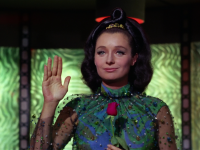
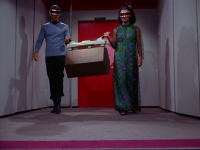
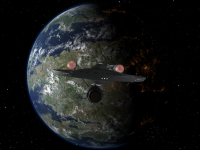
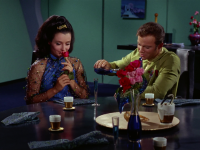
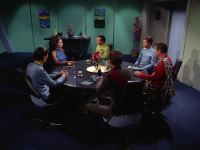
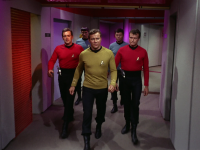
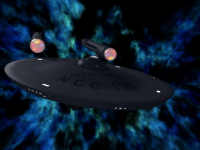
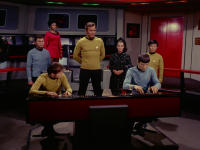
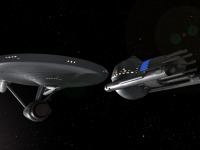
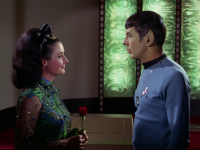
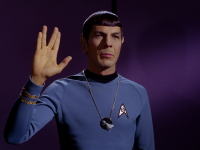
Star Trek TOS - 3x05 - Is There In Truth No Beauty?
Originally Aired: 1968-10-18
Synopsis:
The sight of a Medusan ambassador causes insanity. [Blu-ray] [DVD]
Filler Quotient:
3, bad filler, totally skippable.
- Pretty lame episode with no significant long term continuity.
Problems
- When they cross the barrier at the edge of the galaxy, Spock says: "When we exceeded warp speed factor 9.5, we apparently entered a space-time continuum." As if they weren't in one to begin with? What a poorly written line.
- At the end when Miranda and the Medusan ambassador beam off the ship, Spock puts on his protective visor, but Kirk does not.
Factoids
- This episode contains the first display of the Vulcan symbol of IDIC and the mention of its philosophy.
- Diana Muldaur, who plays Miranda Jones in this episode, has previously appeared as Ann Mulhall in Return to Tomorrow.
Remarkable Scenes
- Scotty realizing he's in the same room with the attempted murderer.
- McCoy: "He's dead, Jim." Count 7.
- The revelation that Miranda is blind.
- Spock becoming the alien ambassador.
My Review
An episode with a lot of intriguing ideas but so poorly executed that they fall flat for the most part. The delightful actress Diana Muldaur having already played Ann Mulhall in Return to Tomorrow returns to Star Trek for a second time to play the blind telepath Miranda Jones in this episode. This time around she is given a much stronger character to play, but unfortunately while Miranda was well conceived and stunningly original, her central motivation of jealousy wasted much of her terrific potential.
Adding to the list of disappointments was the entire concept of an alien that is quite literally too ugly to be observed. While I'm glad the writers attempted to do a truly alien alien, their goal for this plot point of trying to make a commentary about human vanity didn't quite play, as in order for the concept of insanity induced by the mere sight of something to make any kind of sense at all, we have to assume the harmful exposure somehow induces some kind of neurological damage rather than the insanity being caused simply by some component of human shallowness as the episode repeatedly tries to imply.
In that regard, introducing a character like Larry, a man who participated in the design of the Enterprise, was a wasted opportunity. Aside from some quick lines of admiration from Scotty, Larry turns out to be little more than a throw away character to make the Medusan ambassador and Miranda seem dangerous. He spends much of the episode acting clingy toward Miranda in ways that stretch the character's authenticity to the breaking point.
I can certainly see why Miranda wouldn't want to return the affections of a man acting like that, but she acted nearly as irrational throughout much of the episode too, which came as a surprising disappointment for a human character so well versed in Vulcan mental discipline. Especially disappointing was the scene when she misinterpreted Spock's display of the Vulcan IDIC as some kind of personal attack. From that moment forward, her character started to go downhill.
The climax of absurdity for Miranda's character is the moment when Kirk resigns himself to distracting Miranda in the garden while Spock attempts to merge with the Medusan ambassador. The whole scene is premised on the idea that everyone expects Miranda to be too overpowered by her jealousy to allow Spock and the Medusan ambassador to save the lives of everyone on the ship. Once again, like the children from the previous episode, I'm wondering why they didn't just phaser or sedate Miranda if they were so afraid of her presence being that disruptive in a crisis situation.
While I enjoyed that Miranda's layers of complexity were revealed slowly over the course of the plot, the cleverly late revelation of her blindness in particular, her character flaws ended up being flaws in the story rather than the successful establishment of a tragic character. By the end, I felt that the rose metaphor applied more to the episode itself than to the character of Miranda as the writers intended. It's the episode itself that had the beauty and potential for profundity but was marred by the thorns of poor plotting.
Aside from the mixed impact of Miranda, another notable detail was the unusual cinematography of the episode. The Spock POV fight scene was especially interesting to watch and there were a few other similarly oddly shot scenes throughout the episode too. But unfortunately not all of them worked. Much of it felt as though the trippy cinematography was an attempt to distract the audience from a story that verged on incoherence at times.
Last but not least, I'm left to wonder what is it with telepathy episodes and the ludicrous fictional barrier at the edge of the galaxy? This annoying barrier first featured in Where No Man Has Gone Before makes an unwelcome recurrence in this episode, complete with new annoying details to further assault the realism of the story, such as the fact that only a few minutes moving past warp 9 was sufficient to take the Enterprise past the barrier. They must have coincidentally already been pretty close to the edge of the galaxy already for that to happen.
When they cross the barrier, Spock utters perhaps the most ridiculous line ever written for him, when he says, "When we exceeded warp speed factor 9.5, we apparently entered a space-time continuum." Seriously? Something tells me the writers didn't know what a space-time continuum is and were hoping the audience would share their ignorance about one of the most basic concepts in theoretical physics.
Anyway, while this episode definitely has some fun concepts, it could have used a lot more polish before it ever got in front of cameras. A shame.
The following are comments submitted by my readers.
- From Mike on 2008-08-13 at 5:24pm:
Re-watch the film, and pay attention to the extraordinary music and crazy direction. While there are clearly stupid/silly sides to this episode, the filmmakers of ST are still taking things VERY seriously. You can't see filmmaking this crazy outside of avant-garde filmmaking in the 1960s; not even Twilight Zone. - From Orion on 2011-03-16 at 5:26am:
The story could have used a few rewrites. It just jumps from situation to situation and ends up being a typical "get the ship out of danger" episode when it could have been something a whole lot deeper. - From Deggsy on 2012-02-28 at 1:25pm:
Was it established that this was the Great Barrier we've seen in previous episodes? I assumed that it was just a re-used shot, and that the Enterprise has slipped into a pocket of subspace similar to the Chaotic Space in the Voyager episode "The Fight", and so needed assistance to navigate out of.
The one factor of this episode I cringed at the most was how everyone (okay, the men) fawned over the character, declaring her to be so beautiful. It's what the Jabootu website calls an Informed Attribute, where the characters tell us about it rather than show it. Diana Muldaur is a handsome woman, but you'd think these men didn't see women all the time onboard... - From Old Fat Trekkie on 2012-02-29 at 1:28am:
Well Deggsy, I can see you haven't made your way to "Mudd's Women" yet. In that episode the men didn't fawn, they actually drooled. And, yes, it is the same barrier – and of course, in both episodes it is quite idiotic. If it actually did exist, how could one ever see anything outside of the Milky Way? Let’s just chalk it up to less than perfect writing. But, then again, who would have ever thought at the time there would be fifteen thousand PhD theses picking the series apart, or that folks wold be doing exactly what you and I are doing right now.
Keep on Trek’en,
Old Fat Trekkie - From Alan Feldman on 2013-04-06 at 3:56am:
"Is There in Truth No Beauty?"
Problem: If the Medusan is too ugly to look at, why are we, the audience, given any glimpse of it at all? If it doesn't make us go mad, why should it be able to make any of the characters do so?
AEF, aka betaneptune - From Stefan on 2013-04-10 at 10:35am:
Apparently this episode was subject to "executive meddling" after shooting was done, according to the director. http://senensky.com/is-there-in-truth-no-beauty/ - From jd_juggler on 2015-03-26 at 8:51pm:
This episode establishes that people still play tennis in the future.
It also shows the rare (if no completely unprecedented) instance of Kirk being completely unsuccessful in his efforts to seduce a woman. She gave him absolutely no encouragement but he still tried to kiss her. - From Farfle on 2016-09-02 at 4:42am:
There were some funny moments. The first, while perhaps not intentional, I couldn't help but chuckle:
1. Right after Kirk was trying to seduce her in the garden, and she was having none of it, they then find out she was blind, and immediately Kirk says "Well that makes perfect sense!"
2. On the bridge right after the Ambassador inhabits Spock's body, Spock starts talking all weirdly and Bones turns to Kirk and says "That's not Spock", Spock then makes a deriding reply to him, in which Bones turns to Kirk again and says "That's Spock!" with a smile on his face.
As I'm watching the whole series through, when I get to episodes like this that are original, I'm finding myself enjoying them more and more even if they do have their problems. Give me ones like this any day (as well as Spock's Brain) vs the same crappy reused stories and ideas Gene Roddenberry bludgeoned us with back in Seasons 1 and 2. - From Peterwolf on 2020-06-26 at 8:46pm:
Contrary to most other comments, I think that this episode is truly beautiful in many ways. The dialogues are very well written, some camera scenes are excellent like in the best art films of the 1960s, perfectly accompanied by the uncommon music and the acting is on a higher level than in most other TOS episodes. The marvellous sparkling lights suggest that the Medusan Kolos could be too beautiful and not too ugly to see him without getting mad ... Miranda is an exceptional female character, which is realized by distinct and specific relationships to four men: The unfortunate rejected lover Larry, McCoy, who admires her, Kirk, who respects her, but tries to trick her, in order to give Spock an opportunity to prepare the mind link with Kolos and Spock as rival. Miranda tells Kirk "you are a complicated man", which shows a deep understanding of Kirk's ever emerging inner conflicts throughout the whole TOS series. That much about continuity. Above all, Miranda and Spock have to solve the most serious conflict. The merged Spock-Kolos character speaks some of the most beautiful and poetic sentences in all Star Trek series. There are so true words about human nature, spoken with emotion and wisdom. Eventually, the opposing characters Spock and Miranda end up in a mutual mind-meld, which solves the conflict in a rather serious happy end. Seemingly, this episode had too little action, like starship phaser battles, but too much psychology and philosophy in it. I give 12 points or more.
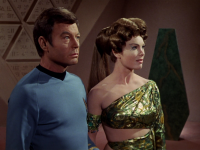
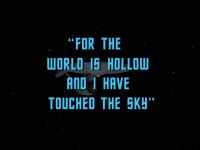
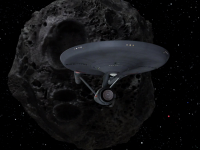
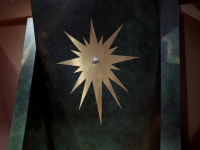
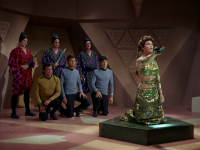
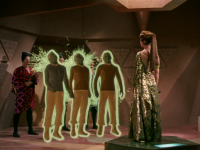
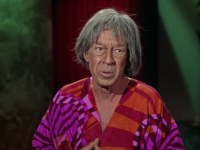
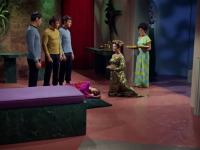
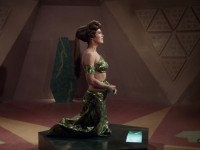
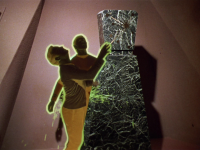
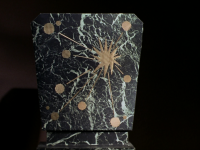
Star Trek TOS - 3x08 - For the World Is Hollow and I Have Touched the Sky
Originally Aired: 1968-11-8
Synopsis:
An inhabited asteroid is on a collision course with a Federation planet. [Blu-ray] [DVD]
Filler Quotient:
3, bad filler, totally skippable.
- Pretty lame episode with no significant long term continuity.
Problems
- Several characters during this episode make reference to the "solar system" the alien ship is on course to collide with. This is a common error. The term they were looking for is planetary system. The planetary system we live in is called the Solar System because our star is named Sol. As such, the term "Solar System" is a proper noun, not a generic term.
Factoids
- Jon Lormer, who played the old man in this episode, also played Theodore Haskins in The Cage (and The Menagerie) and Tamar in Return of the Archons.
- This episode has the longest title out of any Star Trek episode.
Remarkable Scenes
- The Enterprise destroying the missiles.
- McCoy revealing that he has a terminal illness.
- Kirk pleading with Natira, explaining to her what her world is.
My Review
A society of people living on a ship disguised as an asteroid from the outside and disguised as a planet from the inside so the people within won't know that it's a ship. A complex and intriguing premise that unfortunately suffers mightily due to the fact that the plot at no point ever answers this simple question from Natira: "Why should the truth be kept from us? Why should the creators keep us in darkness?" Kirk dodged the question and although he was quite busy at the time trying to save her life, I honestly don't think even the writers knew the answer. For some reason it was all set up for the ship's population to be oblivious and that's just the way was. Don't ask why. Knowing why might make the story more interesting, and we can't have that!
While we're at it, let's not ask why we have yet another alien race that looks exactly like humans, why a civilization that clearly was highly advanced 10,000 years ago would voluntarily reduce itself to this, or why the writers decided to afflict McCoy with both a terminal illness and a marriage only to erase both by the end of the story. Oh wait, I already know the reason for that last one. On Star Trek, the writers have an aversion to main characters growing, changing, living, and dying. This show could learn a thing or two from a soap opera.
Granted, I wasn't the biggest fan of McCoy's romantic scenes with Natira anyway. They were verbose and, frankly, pretty damn boring. But McCoy grappling with a terminal illness and looking to make a change in his life so he can maximize the enjoyment of his final days was a compelling piece of drama. Had it not been manufactured drama with a manufactured cure, it would have been far more compelling. But even with that, there was at least one terrific scene enabled by the manufactured drama. When Kirk, Spock, and McCoy were struck down by the shock and McCoy was the last to wake up, I greatly enjoyed McCoy trying to play off his weakness only to be rendered speechless when Kirk informed him that "Spock knows." Wonderful character moment.
But outside of its intriguing premise and some decent, albeit forced character drama, this episode has little to offer. It's not the worst episode of Star Trek, but it's far from the best.
The following are comments submitted by my readers.
- From Orion Pimpdaddy on 2011-07-13 at 1:52am:
Not bad at all. I think I'd give it a 7.
Things I liked:
-The idea of a controllable asteroid
-McCoy having a new perspective on life
-Spock and Kirk breaking into a sacred temple without much concern (it was funny somehow)
-The old man who had the guts to climb the mountain
-Kirk and Spock discussing the prime directive before interfering. At least they considered the ramifications
-The science in the episode didn't have too many problems
Things I didn't like:
-Putting control devices on people in Trek is way overdone
-Curing a disease within the last minute, that's overdone too
-How Spock was able to predict the asteroid's collision just by being read the coordinates. I know he's smart, but c'mon, at least use the computer to double check.
-I tend to dose off when I watch this episode. The scenes between Mccoy and the woman are very calm (I wouldn't say boring) and the music is very soft
Other thoughts I had:
-I sure hope Spock shared the "cure" to Mccoy's disease with Starfleet, since I imagine the same disease is killing millions of people each year. Actually, he needs to have a conference call with every doctor in the quadrant at once. "I have the cure!"
-The updated Blu-Ray edition has some nice shots of the missiles (at the beginning) and of the asteroid. I think some of the special effects within the "chamber" were also cleaned up
-Does every species in the galaxy have the same code of conduct when it comes to hospitality? Just about everyone Kirk and Spock meet offers food and drink at some point. I do realize it's an easy way to set up a dialogue scene and to introduce the characters. - From Alan Feldman on 2012-02-11 at 2:55pm:
Only one barrage of missiles? And a small one, at that. Pretty lame defense. And it simply draws attention to the source. As far as I can tell, the Enterprise was minding its own business, so why attract "trouble"?
I cringed every time Natira said "the people."
At the end when Kirk and Spock find Natira on the floor in the Oracle Room and then proceed to get the book, why doesn't the Oracle just zap them again? Instead you get a short duration of medium-strength wind (inside a closed room!) and heating elements turned up full blast. Aside from that, Mr. Oracle suddnely becomes quiet and impotent for no apparent reason. And after Spock turns off the toaster coils, wouldn't it take a while for the room to cool down?
Perhaps this story is to show what happens, or what it's like, when all you have is dogma, when you're not allowed to ask questions, and so forth. There'd be endless ignorance and no science. Galileo vs. The Church comes to mind.
Why the dogma? Perhaps to maintain control and keep order.
Note when Natira says, "Is truth not truth for all?" Interesting that the Oracle comes up with the idea of multiple truths: "their truth" and Yonada's truth, instead of just saying that our heroes are wrong. (Perhaps Mr. Oracle is just being polite!)
McCoy: "Press the three lower planets on the left-hand side." Obviously this is Yonada's version of Ctrl+Alt+Del.
As far as main characters dying for credibility's sake, I'd rather see them again next week (JMHO). Although I did like the idea of McCoy changing his life, we need him back next week. The show would suffer immensely without him.
Furtermore, credibility in Star Trek is already stretched way beyond reason: gravity everywhere, all the time, in heavily damaged ships, in ships playing dead, on asteroids, inside asteroids, people falling over when the ship "tilts"; ignorance of the existence of inertia (Newton's First Law), as in the crew not being splattered against the wall during the incredible accelerations of the ship (I imagine that the artificial-gravity machine somehow takes care of that, even though it has trouble with "tilting" during an attack), and needing engine power just to keep going at a steady speed (there's no friction in space!), "drifting," "stopping" (okay, stopped relative to the galaxy); faster-than-light travel; multiple earths; an "energy barrier" at the edge of the galaxy that one somehow can't just go above or below; psychic power, "mind transfer," entities made of "pure energy"; etc. So what's adding on just one more? As much as I cringe at all the bad science, I love the show. Even the bad episodes have their moments. And never forget the fun aspect of the show. - From Strider on 2012-06-27 at 3:24pm:
Just a quick correction to Mr. Feldman--your example of Galileo "vs" the Church is a commonly misunderstood one and doesn't really apply to this situation. I don't want to argue about it on here, but you can read more here: http://www.catholic.com/tracts/the-galileo-controversy.
I like this episode. I'm always pleased with the ones that have relationships, rather than action, at their core, and this one had some good moments.
--Chapel arguing with McCoy at the beginning. --McCoy telling Kirk about his illness.
--Kirk unsure how to treat McCoy once he found out about the illness.
--Spock asking, "May I ask precisely what is troubling the doctor?"
--Kirk telling Spock about the illness. Spock's grave "Yes, I know of it, Captain," with the raised eyebrow.
--Jim's eyes downcast as he says seriously, "Then you know that nothing can be done."
--Spock resting a hand on McCoy's shoulder as he came out of unconsciousness. McCoy's look, not at Spock, but at Jim, and Jim admitting, "Spock knows."
--Love the little old guy. When McCoy says about the "energy powder," "Tastes like an ancient herb derivative," I thought that the powder would contain the cure--which of course was coming.
--McCoy asking, "Is that too much to ask?"... that he live out his last year with some happiness. And really, is it?
There were definitely problems, as there always are. My biggest one is that McCoy and Natira are married, but they just decide to go their separate ways at the end. It's nice, though, that Kirk arranges for them to have some time together. But a wife, for heaven's sake, isn't the same thing as one of Kirk's alien girls. Do we ever hear about her again?
- From Alan Feldman on 2012-09-05 at 12:58am:
Strider wrote on 2012-06-27 at 8:24am:
"Just a quick correction to Mr. Feldman--your example of Galileo "vs" the Church is a commonly misunderstood one and doesn't really apply to this situation. I don't want to argue about it on here, but you can read more here: http://www.catholic.com/tracts/the-galileo-controversy."
And Mr. Strider, you can read more about it here: http://en.wikipedia.org/wiki/Galileo_affair.
AEF - From Alan Feldman on 2013-01-27 at 5:53pm:
More on "For the World Is Hollow . . ."
At the beginning of the show, Natira and some guards apprehend our heroes on the surface of the asteroid. How can they not know from this that their world is not limited to what's inside the asteroid? And again when two of the guards leave Kirk, Spock, and McCoy on the surface? At one point Kirk says to Natira, "You are living inside a hollow ball." She was on the surface outside the hollow ball at the beginning of the episode! She needs to be told this?
How did they round up "their best people" and put them on this disguised space ship without their knowing what's happening? Did they zap them with dumb-down rays? That could be how they got them to accept the instruments of obedience, too, and thereby the Oracle dude. And all this was done by the lesser people? (Okay, maybe it was done by their second-best people.)
When Spock points out that letting the Yonadans know they are on a space ship would violate the Prime Directive, Kirk points out the obvious that it's better than allowing their destruction and that of the 3 billion inhabitants of Darren 5. On the other hand, only Natira needed to be told, but they'd have to put the Oracle dude back in charge. But "the people" would find out in the end anyway.
A similar problem happened in TNG in the episode "Homeward", but with the captain favoring the extinction of a people in order not to violate the Prime Directive, possibly even with a religious-like, unquestionable belief. Regardless, I don't see the logic in allowing an entire civilization (and in the case of this TOS episode, a second totally unrelated civilization!) to be wiped out for sake of the Prime Directive. Extinction interferes with the normal and healthy development of the alien civilizations. While extinction is normal, it's certainly not healthy! Kirk got it right.
AEF - From Simon on 2013-02-04 at 11:00am:
To answer the point raised in another post, the landing party do not land on the outside of the asteroid, they beam down to a point inside the asteroid (this is stated in the dialogue). From that point the inner surface of the hollow asteroid looks just like the sky. Presumably it's some kind of giant display screen - later on Natira says she can see the sun and the stars, presumably these are images displayed on the screen/sky. This is also the reason why it is possible to touch the sky if you climb a high enough mountain. - From Alan Feldman on 2013-04-06 at 9:36pm:
"The World Is Hollow . . . post 3"
Reply to Simon's post regarding landing on the asteroid
Thanks for your response, but I checked it out and still think they landed on the surface.
SPOCK: Asteroid has an outer shell, which is hollow. It surrounds an independent inner core, which has a breathable atmosphere. Sensors read no life forms.
My interpretation of this is that the surface is the outer shell. Either way there must be two breathable "atmospheres", and Spock is referring to the inner of the two.
(Dead flat soil, rocky outcrops, orange sky.)
MCCOY: You'd swear you were on the surface of a planet.
SPOCK: One fails to see the logic in making a ship look like a planet.
This sounds to me like they're on the surface of the asteroid.
After being captured, our heroes are led underground. What is the point of this if they were already inside the asteroid? There'd be two artificial skies and two artificial suns. Seems ridiculous to me.
[A side note: Since the inside of the outer shell (in my interpretation) is the Yonadan sky, our heroes descend through the tube buildings right through it! That must be at the top of the mountain no one is allowed to climb. The whole thing is just plain ridiculous.]
Add to this there bring near-Earth-strength gravity on the surface of the asteroid (in my interpretation), asteroids being too small to have appreciable gravity, and near-Earth-strength gravity inside the asteroid, in a arbitrary direction, no less (although the latter is a matter of course in Star Trek). Add to that the fact that asteroids are not massive enough to hold onto an atmosphere, and it's all just plain ridiculous.
Bottom line: Either of our interpretations leads to a ridiculous asteroidal environment.
AEF, aka betaneptune - From Vandervecken on 2014-01-10 at 7:21pm:
Am I missing something? How does Spock know what the Fabrini language looks like if the Fabrini world was destroyed by a nova approximately 10,000 years ago? - From Rick on 2015-03-18 at 6:22pm:
At Alan Feldman:
Simon is right, you are mistaken. The people live underground. There is not a "second sky" inside the second hollow shell. Spock or someone else mentions that they began to live underground on their planet before they launched the asteroid ship. So it makes sense that they would still live "underground" on the asteroid ship for either continuity of lifestyle or to keep up the ruse. - From Alan Feldman on 2015-05-03 at 11:33pm:
At Rick:
Yes, they live underground. How does that conflict with what I said?
OK, so they live underground. At the beginning of the episode they come out of those tube things. Are the tube things underground, too? If so, how? So how does that work with the sky?
As best as I can tell, the tube-things are not underground, and when Natiria and company emerge from them and fight with our heroes we see a sky. Then they go underground and see what certainly must be a different sky!
Recap: When they land on the asteroid they are under a sky. They are captured and led underground. And even though we don't see it, I assume there is an underground sky. You're now telling me that these are one and the same sky? How?
No one is right on this because the whole thing is ridiculous and screwy to begin with.
The only sensible point of the episode seems to be how bad things happen when you're not allowed to question things and are forced to accept dogma. - From Rick on 2015-08-14 at 4:51am:
Feldman,
I don't know how to explain it to you if you don't already get it, but there are not two skies. There is one sky. They beam down to the surface with the sky above them. Then they go "underground" (from the perspective of the asteroid people). There is I sky in that underground area. Rewatch it, you are missing something, it all makes sense. - From Rick on 2017-02-16 at 3:41am:
To Kethinov: the episode states pretty clearly that the civilization reduced themselves to this because their star was about to nova. I imagine that the civilization survived elsewhere through colonies and by integrating into other civilizations, but it is certainly reasonable that the remaining people on the planet constructed this ship/asteroid in order to maintain their underground lifestyle and overall way of life. That also explains the secretive nature, along with the fact that maybe they thought it was easier for a civilization to handle a 10000 year trip under the lie they created.
Per usual, good sir, you grasp at straws to tear down TOS episodes. I really dont think you understand the pacing and plotting of older television. I understand your reverence for the serialization of television, but a lot of us like Gunsmoke, Bonanza, TOS, and Law&Order more than the serialized shows. Doesnt make you or us right or wrong, but I think it is a little disingenuous to present your side as objectively correct so often.
As for the pacing, it is entirely about what you are used to and what you prefer. That is in a vacuum of course, as individual episodes from any era can be too slow or too fast, but since you continually say that TOS episodes are too slow without ever saying a single one was paced too fast (I dont believe), that clearly shows a bias.
Long live classic television! - From Chris on 2018-08-05 at 2:51am:
Of course, it has ALL the traditional problems of Star Trek!
Who cares in this case? At least... to me anyways...
I liked the tenderness of Natrira and McCoy, and his 'vulnerability'?
My biggest problem is the timelines... This ship had been cruising for 10,000 years!!! Humanity has only been 'intelligent' for 5K, tops from this time period!!!
So how would humans know about a society cruising through space after leaving a star that was known to have gone supernova 10k yrs prior?
I understand that they have FTL abilities, and thus, time!
... but throw me a bone here!

Star Trek TOS - 3x22 - The Savage Curtain
Originally Aired: 1969-3-7
Synopsis:
Kirk and Spock are forced into a battle of good and evil. [Blu-ray] [DVD]
Problems
None
Factoids
None
Remarkable Scenes
- Abraham Lincoln floating in space. WTF?
- Uhura not taking offense to Lincoln's accidental racist remark.
- Spock correcting Scotty when he pointed to the direction Earth was in. Hilarious!
- Surak's appearance.
- Surak: "Perhaps it is our belief in peace that is actually being tested."
- Lincoln: "There's no honorable way to kill, no gentle way to destroy. There is nothing good in war except its ending."
My Review
One wonders how much respect an ancient revered European leader like Sir Winston Churchill or an Asian leader like Mohandas Karamchand Gandhi would get on this most blatant episode of Americans in space. Thankfully, McCoy's and Scotty's objections offset Kirk's odd behavior. Unfortunately, yet another alien who forces our cast to fight for its own amusement. One remarkable detail is that Kahless is considered evil in this episode. In TNG he is considered quite the honorable figure. This isn't necessarily a technical problem; surely the Klingons are considered evil by Kirk, and the alien in this episode just extracted that impression in his recreation of Kahless. Ultimately, this episode consists largely of pointless fighting which makes it totally inconsequential. I wish there was less of this in Star Trek.
The following are comments submitted by my readers.
- From TashaYar on 2008-09-15 at 4:38am:
I just saw this ep again the other day... interestingly they address your objection. In the transporter room, Scotty in his dress uniform says something about rendering honors to "Lincoln" and asks who will be next, will it be Robert the Bruce. Kirk enters at this point, having overheard the remark, and replies "in that case we will render appropriate honors to him as well." For further details see "http://startrek.wikia.com/wiki/Robert_the_Bruce" - From technobabble on 2010-11-22 at 9:48pm:
Seemed odd that the aliens did not understand the good vs evil moral dynamic of the human condition but chose to interpret it only through small bout of combat. If they could use the ship's library etc. to replicate important historical figures could they not also sift through historical analysis?
Aliens seemed only interested in the brute strength of the two moral philosophies & dismissed the rest, making the story only about the contention that good & evil have to function similarly in times of war, offering the peace laurel at the wrong time can just leave you dead.
Points for showing a unique alien this time, made of scalding volcanic living rock.
- From Orion Pimpdaddy on 2012-05-27 at 11:11pm:
It's the Hunger Games! LOL The fight ends very prematurely, probably because they stuffed too much into a one hour show. They probably could have scrapped the whole "Lincoln walking around the Enterprise" bit in order to show a more complete battle on the surface. Still, it's not a bad episode. I thought the pacing was perfect, and the lava being's costume is the best costume of TOS. On the Blu-ray version, the planet's new appearance enhances the episode quite a bit. There's a part where a section of the lava planet changes to earthlike conditions, and it is now clearly seen. I'm not sure why the creature created such a large arena for everyone to fight in though (thousands of miles). - From Warp factor 10.1 on 2012-07-19 at 11:11pm:
I love it when superior beings abduct different species from around the galaxy to pit them against one another, as in 'Gamesters'. It's just what superior beings ought to do and why the other series aren't as good (they seem to have given it up).
Like you, I'm puzzled by the choices for the two sides. What about Hitler, Margaret Thatcher or Dick Dastardly for the baddies? - From Jake on 2019-01-11 at 2:11am:
This episode further confuses the Klingon forehead issue by showing Kahles as a TOS style klingon.

Star Trek TAS - 1x16 - The Jihad
Originally Aired: 1974-1-12
Synopsis:
On Vedala, Kirk and Spock are summoned to learn about a stolen religious artifact that could ignite a galaxy-wide holy war, a jihad. [Blu-ray] [DVD]
Problems
- Why didn't they use a shuttle or some other anti gravity vehicle since the planet they went to was filled with lava flows?
Factoids
None
Remarkable Scenes
- Lara declaring herself attracted to Kirk.
- The zero gravity fight.
My Review
The Vedalans are an interesting concept. A powerful race, moreso than the Federation, but not super god aliens like we've seen so much of already. They're neutral, but friends of the Federation. They're something like galactic prophets. The power to watch, but not the power to act. Maybe they're guided by their own version of a prime directive. In any case, they were a cool idea. Unfortunately, this episode suffers from some fuzzy plot logic. We're not told exactly how stealing the Soul of Skorr would cause the mass breeding of soldiers. I guess we're supposed to assume that the defacing of a religious symbol drives their race into a Jihad. Or maybe Tchar was just nutty. The audience shouldn't have to come up with this stuff though. Overall an interesting episode, but dragged through the mud by a bit of bad writing.
No fan commentary yet.

Star Trek TNG - 1x05 - The Last Outpost
Originally Aired: 1987-10-19
Synopsis:
The crew encounters Ferengi bandits. [DVD]
Filler Quotient:
3, bad filler, totally skippable.
- While this is the first appearance of the Ferengi, it is not necessary to see this episode to understand later episodes, even Ferengi-centric episodes.
Problems
- Geordi says that the Ferengi are "now angling through that solar system." This is a common error. The term he was looking for is planetary system. The planetary system we live in is called the Solar System because our star is named Sol. As such, the term "Solar System" is a proper noun, not a generic term.
Factoids
- Armin Shimmerman, one of the Ferengi in this episode eventually goes on to play a regular Ferengi character on DS9 named Quark. He also guest stars as Quark in both a later episode of TNG and Voyager making him one of very few characters/actors to play in at least one episode in all three series.
- This episode establishes that Ferengi are capable of resisting Betazoid telepathy.
Remarkable Scenes
- The Chinese finger trap scene.
- The Ferengi expressing disgust at "clothed females."
My Review
Another stylistically awkward episode, but not as bad this time. The Ferengi are thought to be a serious threat at first, but it turns out that they were merely posturing to appear more threatening than they actually were. In reality they are mostly harmless and totally ridiculous. Meanwhile, yet another godlike alien shows up and also appears to be a serious threat at first, but is soon mollified by Riker answering a few riddles. Riker then gets all chummy with this "guardian of the Tkon Empire" who for some reason isn't all that broken up about having slept through the demise of his entire nation.
Contented with having an insufferably smug conversation with Riker about the inferiority of the Ferengi right in front of them, the guardian then disarms the automated weapon that disabled both the Enterprise and the Ferengi ship, then makes known his intent to return to his everlasting coma, possibly never to be seen again by anybody ever. Okay. Right. Sure.
Clearly these parallel scary aliens who turn out not to be so scary after all were meant to mirror TOS: The Corbomite Maneuver, one of TOS' less savory episodes. This episode manages to only slightly improve on the original's formula by having slightly less terrible pacing. It appears they also wanted to evoke TOS by beaming over the Chinese finger traps to the Ferengi ship. This is similar to how Scotty beamed over the tribbles to the Klingon ship in TOS: The Trouble with Tribbles.
Setting aside Star Trek's oft-overwrought stylistic choices though, there are some nice details here. It's nice to see the Ferengi make an appearance, who were first mentioned in Encounter at Farpoint. The designs of their ship, alien makeup, and their weapons were memorable too. And while their function as a caricature of capitalism was as overwrought as most of the rest of the episode, the idea of portraying a less socialist and more capitalist version of the Federation on Star Trek is intriguing. As such it would be well worth exploring the Ferengi in more depth later, though next time hopefully less childishly.
The following are comments submitted by my readers.
- From DSOmo on 2007-05-27 at 3:19pm:
Changed Premise: during this episode, Troi says she "senses the Ferengi captain is hiding something." In the future episode "Menage a Troi," Betazoids cannot read Ferengi minds.
- Just after the force field seizes the Enterprise, something begins reading information from the ship's computer. When Data's workstation is shown, some of the information is being displayed upside down (i.e. the Klingon and Federation symbols.
- In Picard's first attempt to contact the Ferengi, he asks Yar to open hailing frequencies, and she quickly responds. Then Picard says, "At least we won't begin with weakness." Why would he say something like that with the hailing frequencies open? That is the last thing he would want the Ferengi to hear!
- When the away team beams down to the planet, Riker appears alone. He begins walking around and yelling for the others. Why doesn't he just use his combadge? It is true that Data later discovers the communicators are out, but Riker never even tried to use his. - From Bernard on 2007-09-30 at 12:10pm:
I don't rate this episode very highly now, but I do find it to be a bit of fun and at the time I thought it was fascinating. Probably because of the following;
A good glimpse at a new race that have some kind of genuine technology and menace (not for long though)
Riker gets something of a centre stage while picard is stuck on the ship (something that happens many times over the first 2 seasons)
The start of this episode is great, the tension created by following the unknown ferengi (which soon evaporates as the story unfolds)
overall not a terrible outing for me, but too many weak points - From Jeff Browning on 2011-10-20 at 9:51am:
An interesting, if small, detail: In early TNG when establishing communications, Star Fleet personnel say "open a frequency". Later this shifts to "open a channel". Not sure for the reason for this change, but "open a channel" sounds better to me. - From Jim on 2011-12-25 at 2:28pm:
Geordi's reaction to Riker's plan to jump to Warp 9 then "come back fightin'" is far and away the worst line and the most poorly delivered line in the entire series. - From Azalea Jane on 2021-07-04 at 6:22pm:
This ep certainly isn't the worst of Season 1. It's not quite "bad," per se, but there's not a whole lot redeeming about it either. Watching it this time, though, it sparked a new idea for something I can do during my current rewatch: I'm calling it "Data's Emotionspotting." I know a lot of it in this episode is first season awkwardness, but even later on, Data displays MANY expressions that could be interpreted as emotive or illogical. It's clear that Soong has programmed him to have at least *some* quasi-human reactions to things (such as interest and confusion), even though he reports not experiencing the emotions themselves. That's actually somewhat believable, considering what we find out about Lore later.
Examples of Data's weird behavior in this episode:
- his aside to LaForge about second officers. He'd display no dismay or relief, especially around a comment that doesn't not actually affect him. It was a cool little camera trick, and kind of a funny line, sort of, but it's so out of character it just feels gratuitous.
- his offhand comment about Yankee Traders while the Ferengi captain was onscreen. Unprompted and -- as he should know -- counterproductive. Data is usually cautious about talking out of turn.
- when he gets his fingers stuck in the finger trap, he seems embarrassed. Also, he should be strong enough to break the finger trap! (BTW, what was that finger trap doing there in the first place?)
I wonder what TPTB (the powers that be) were thinking when they designed the Ferengi in this episode. Could they not see how pathetic and dislikable the Ferengi are here and how unconvincing of a villain they are? Fortunately TNG did come up with some very worthy antagonists like the Borg and the Cardassians later on.
Nitpick: on the planet in front of the Portal guy, they keep referring to "humans" when Worf, a Klingon is standing right there, and nobody points it out. This is a continuing problem throughout the series, too - Troi, Worf, and/or Data are constantly lumped in with "humans", even though Troi is half human, Worf was only raised by humans, and Data is a human-shaped android lacking (most) human emotion -- none of them full humans.
Agreed with Jim above how LaForge's line about "come back fighting" is cheesy as hell! - From kevin on 2021-09-01 at 11:32pm:
Wow, I just watched this today, in 2021, have not seen it for literally 30 years. I forgot the story. The beginning is QUITE suspenseful and has great music and packing. I was tense and trying to figure out what the Enterprise and crew were going to do. THEN....They hit the planet with the Ferengi and the story goes mostly to hell. It becomes an old TOS type story, and is silly on top of it. SO, not horrible, but just quite blah overall.

Star Trek TNG - 1x08 - Justice
Originally Aired: 1987-11-9
Synopsis:
Wesley is sentenced to death. [DVD]
Filler Quotient:
3, bad filler, totally skippable.
- Pretty lame episode with no significant long term continuity.
Problems
- In the opening lines of the episode Picard refers to the "Strnad solar system" and the adjoining "Rubicun star system." Both terms are wrong. This is a common error. The term he was looking for is planetary system. The planetary system we live in is called the Solar System because our star is named Sol. As such, the term "Solar System" is a proper noun, not a generic term. The term "star system" is also wrong because that term is supposed to refer to a system of stars, not a system of planets, e.g. a binary or trinary star system.
Factoids
- This episode establishes that capital punishment was fully outlawed in the Federation sometime between TOS and TNG.
Remarkable Scenes
- Worf: "Nice planet."
- Worf's statement that he would have to restrain himself during sex with a human woman so as not to injure her and Riker's amused reaction.
- Picard: "Data, don't babble." Data: "Babble, sir? I'm not aware that I ever babble, sir. It may be from time to time I have considerable information to communicate and you make question the way in which I organize it..."
- Data offending Beverly with his fascination over her panic about Wesley's predicament.
My Review
The crew enjoys some shore leave on yet another planet whose alien inhabitants look exactly like humans. Picard finds that detail oddly remarkable, but by now we have so many similar examples. The unimaginative blandness of the Edo is further compounded when it turns out they are mindless pleasure zombies exhibiting behavior so shallow it's hard not to spend half the episode groaning at that alone. But worry not, there is plenty else to groan about. Not the least of which is their asinine criminal justice system.
The idea that the Federation should be high-minded enough to respect the local laws and customs of the sovereign nations they visit is a good premise for a story, but it's explored in a mostly sloppy way here. For starters, just visiting the planet to begin with was a violation of the Prime Directive, since they were clearly not a spacefaring civilization. Despite that the Edo seemed oddly aware of the existence of other civilizations, or at least totally unsurprised to receive visitors from outer space.
But even leaving all that aside, the Edo's policy of randomly executing people for trivial and even accidental violations of law—but only sometimes when that law is deemed punishable today by the roll of the dice—is the stupidest idea for a criminal justice system ever. It lacks both consistency as well as justification for the lack of consistency. For any kind of enlightened system of criminal justice to make sense, there has to be equality under the law. And in cases where the law is applied unequally, there tends to be some kind of underlying societal motive, like systemic discrimination, or simply the arbitrary whims of a cruel ruler.
But such motivations are not present here. Instead, the Edo just seem uniformly idiotic. They can't figure out a way to enforce their laws uniformly, so they just do it randomly and don't see any problems with that whatsoever. Given that, it's no wonder Picard chose to violate the Prime Directive to be rid of these people. Their local laws and customs are so idiotic that they simply don't deserve to be respected. The Prime Directive was dreamed up by someone who never expected alien civilizations to be this stupid.
That said, watching Picard wrestle with the ethics was still pretty compelling. It would've been nice if such scenes were set to the backdrop of a more compelling moral dilemma, but they were still well executed all the same. And despite how overwhelmingly lame the Edo were as a concept, watching the crew make the most of the experience certainly resulted in a series of pretty amusing, if at times overly goofy scenes. So while most of this episode is pretty painful, it's somewhat offset by some good stuff here and there.
The following are comments submitted by my readers.
- From DSOmo on 2007-05-28 at 6:02pm:
- How can Yar review the Edo's laws and customs, but not know the price for violating them (one punishment for any crime)?
- Picard tells Troi that he wants to speak to Dr. Crusher personally about what has happened to Wesley. When Picard returns to the Enterprise, Dr. Crusher stops him and demands to know what he is going to do about Wesley. She states that she read the away team report. What away team report? The away team is still on the planet. Even if they had made the report from the planet, Picard just told the away team that he wanted to handle the situation.
- There is a simple solution to the Prime Directive dilemma in this episode. Picard already used this solution in "Code Of Honor." Why not let the Edo inject Wesley, watch him die, beam him back to the ship, warp away, and resuscitate him? At one point, Riker took a syringe from a mediator, they could have used it to make an antidote. - From Bernard on 2008-01-16 at 12:46am:
There are not many episodes that I rate as lowly as this one.
I find it insulting to my intelligence that picard and the crew spend the latter portion of the episode worrying over breaking the prime directive when by the very fact they have revealed themselves to such a primative culture is surely against the prime directive in the first place!
Other than that, there are a few small delights such as the first time worf describes something as merely 'nice'. A few nice moments for Gates McFadden to sink her teeth into, and in my opinion Wil Wheaton does remarkably well with some atrocious dialogue. - From Sherman on 2016-06-30 at 7:55am:
I've been watched everything on this list and read every review after I watched an episode and out of everything this episode stuck with me the most because of the absolute law and the captains decision to ignore the prime directive and just take Wesley with him. - From Chris Long on 2020-07-25 at 1:24am:
You know? I like light-skinned folk as much as the next guy, but this race of beings is far more irritating than the TOS Episode, the Apple where everyone was some hunk version of a white Adonis!
Who thought this was a good idea?!?!?
... I'm no BLM guy but come on!!!
This episode just insults every sense of intelligence of all but the absolute stupidest people in existence!
How could this crapfest ever get past the producers?!?
Pure garbage, start to finish. And While I understand they were fleshing out the characters, this is worse than the worst TOS episode by miles and miles!
Season one of TNG is truly a throwaway season in every sense. I can't believe my kid and I loved it so much when it first came out!!!
He even had genuine TNG uniform! He'd have been a much better Wesley too! - From Azalea Jane on 2021-07-05 at 11:50pm:
This ep is so silly it should basically be non-canon, like Force of Nature. Many violations of the Prime Directive in TNG are a little bit more circumstantial, but this is one is straight up "we found a nice planet with some horny aliens on it and we're gonna go chat with them and vacation on their planet!"
They don't seem to have (or even think to look for) any anthropological data on the history of Edo society or any other societies on their planet. They just materialize out of nowhere and the Edo are apparently not fazed by this!
Agreed with DSOmo above -- Yar says "I've listed my report on their customs and laws, sir. Fairly simple-- common sense things." Not looking at the punishments is a massive oversight for a security chief.
I also noticed something along the lines of Chris Long's comment above: Every Edo is white, blonde, fit, and apparently straight, living in an orderly society enforced by an extremely authoritarian legal code and protected by an actual god. An Aryan paradise! We're not supposed to respect the Edo, exactly, so it could be interpreted as a subtle dig, but it still rubbed me the wrong way just a tiny bit, even as a white person myself. (Maybe I'm just jealous I'm not blonde.)
I do like the takeaway: that justice -- and morality -- aren't about blindly following a rulebook. Despite the hamfisted way they delivered it, it's a nice way of stating one of Trek's principles directly.
Data's emotion-spotting:
- when the orb appears out of the bridge floor, Data looks scared.
- his un-self-aware babbling isn't quite an emotion, but it's not logical! - From The T'Obum Empire on 2023-04-16 at 8:31pm:
In the beginning Wesley gets told this:
LIATOR: "Our rules are simple. No one does anything uncomfortable to them."
He forgot the part where you get the death sentence if you step on the wrong patch of green at the wrong time. - From Chuck the Canuck on 2023-05-19 at 4:27pm:
Liator, the male Edo leader, responds to the Away Team with dripping sarcasm about how backward their justice system is compared to the Federation's. But take away the sarcasm, and his words are correct. They're in pretty desperate need of some social evolution on this. You would think living in such a leisurely paradise of society is an appealing enough reason not to break the law. Are the Edo so prone to violence or crime that the only way to enforce this idyllic society is to execute even those in the wrong place at the wrong time?
More interesting to me was the ship, city, being, or whatever you want to call it in orbit of the planet. After being contacted by it, Data speculates they have accepted their role as a deity for the Edo at this stage of their development. Perhaps they even planted the Edo there. What's the backstory on this, and did it happen before or after the Edo became...the Edo?
In the end, all this episode does is contribute to TNG's gradual chipping away at the logic of the Prime Directive. By the end of the series, it will be in tatters.

Star Trek TNG - 1x14 - Angel One
Originally Aired: 1988-1-25
Synopsis:
The crew travels to a planet with a matriarchal society. [DVD]
Filler Quotient:
3, bad filler, totally skippable.
- Pretty lame episode with no significant long term continuity.
Problems
- The Elected One greets the away team as "representatives of the star fleet Enterprise."
- When Riker and The Elected One are sharing an intimate evening together, a hand reaches out to grab her drink. In the remastered version released in 2012 this was corrected by reframing the shot.
- At the end of the episode they depart at warp 6. But Data timed their departure to the minute assuming they'd leave at maximum warp.
Factoids
None
Remarkable Scenes
- Riker submitting to local apparel and refusing to consider it degrading over Troi's and Yar's objections.
- Sick Picard humbly and reluctantly obliging to the doctor's orders.
- Geordi in command and loving it. "Make it so."
- Worf sneezing.
- Riker's martyr speech.
- Data's facial expression when Riker gives him a pat on the shoulder.
- Picard's hoarse voice.
My Review
This is a pretty painful episode to watch for a number of reasons. Once again the aliens shown here are yet another alien race that looks exactly like humans, complete this time with characters who have western names like Ariel and Trent. They were so indistinguishable in fact that when the Enterprise wanted to find the Odin survivors, they had to resort to searching for an element not natural to the Angel One world rather than just using the sensors to find non-human life signs. The distinction that they evolved in such a way that their women are bigger and stronger than their men due presumably to millions of years of matriarchy altering the dynamics of their natural selection process is a reasonably plausible and interesting story idea to explore in an alien civilization, but whatever story potential there was in exploring such a premise was undermined considerably by its sexist portrayal, not unlike what happened in Code of Honor.
Another issue was the muddled portrayal of the Prime Directive. It isn't clear why the Federation maintains any sort of contact with Angel One at all given that it doesn't appear to be a spacefaring civilization. It was stated that the planet's location was strategically important, so perhaps the Federation made an exception to the Prime Directive when establishing diplomatic relations 60+ years ago, similar to what might've gone on in TOS: Friday's Child. But that isn't the only Prime Directive complication here. In contrast to how previous episodes defined the Prime Directive, Data and Riker make a big point about how it apparently only applies to Starfleet personnel, and apparently not to individual Federation citizens. This is a completely nonsensical distinction. A law like that would be as idiotic as if the Indian government passed a law prohibiting contact with the uncontacted North Sentinelese tribe, but only applied the law to agents of the Indian government, excluding ordinary citizens for some reason, which is not the case for fairly obvious reasons.
These wrinkles do much to wreck what is otherwise a fairly fun episode. The virus B plot and the Romulan C plot were both fairly compelling. A better episode would've focused on that exclusively. Plus how can we not be charmed by Geordi in command and loving every minute of it?
The following are comments submitted by my readers.
- From DSOmo on 2007-06-01 at 3:45am:
- More matter leaving the holodeck, a snowball hits Picard as he is walking by.
- When the Enterprise begins to search for the survivors, Picard orders Geordi to break fixed orbit. If the Enterprise is in fixed orbit, it would remain above a given location on the planet's surface. However, the shot before Picard's order shows the planet turning in one direction and the Enterprise flying in another. - From CAlexander on 2011-03-02 at 6:05am:
I found the acting of the denizens of Angel One, and the shipwreck survivors, to be boring, and I didn't care about any of them. And the side plots weren't interesting at all - they get sick, they get better, they fly away. I was, however, amused by Riker going native, and his ending speech was good. - From Jeff Browning on 2011-10-20 at 12:43pm:
This is the first episode to feature Riker's propensity to be a manwhore. He has absolutely no compunction about jumping into bed with any reasonably attractive female. Of course, this makes him the stud of TNG, at the expense of Picard who is, in live stock terms, a "shy breeder". I.e., Picard has intimacy issues. Both themes get played out later in future episodes, e.g., TNG: The Game for Riker and TNG: Captain's Holiday. - From dubton on 2016-07-24 at 7:28am:
Having sex while this episode plays in the background is, by far, my greatest fantasy. All criticism, in the interest of diplomatic relations, is forfeit. We have muuuuuuuuch to discuss and set phasers to sttttuuuuhhhhh-unnnnnnnnn - From Rick on 2017-02-24 at 1:06am:
It is my understanding that the Prime Directive does not apply to non-Starfleet personnel. The Federation is all about freedom and equality, so I do not think they would have this overbroad restriction on the liberty of all of their citizens. What right or jurisdiction would the Federation have over the actions of its citizens hundreds of lightyears away on non-Federation planets? None of course.

Star Trek TNG - 1x18 - Home Soil
Originally Aired: 1988-2-22
Synopsis:
Data and Geordi discover a "microbrain." [DVD]
Problems
- Apparently, unlike TNG: The Naked Now, nobody bothered to do a historical lookup, as everyone seems surprised at the idea of non-organic life even though silicon-based life was featured prominently in TOS: The Devil in the Dark.
Factoids
- This episode establishes (implicitly) that the Genesis device was ultimately a failure, as traditional terraforming techniques are used.
Remarkable Scenes
- Data dodging and eventually destroying the drilling laser.
- Worf, facing Geordi: "But is it alive?" Computer: "Probability high." Worf, facing computer terminal: "I wasn't asking you."
- The aliens referring to the crew of the Enterprise as "ugly bags of mostly water."
My Review
This episode, like the previous one, but less so, is dull and annoying. Plot-wise, it's fairly average, but some remarkable oversights drag this episode down a bit. Firstly, in an episode all about terraforming, I would have wanted to see some information about the Genesis device presented in this episode. Even though it was probably declared a failure and disregarded, for continuity's sake it would have been interesting to see it talked about. This is not necessarily a technical problem; it makes sense that the details concerning the events surrounding the testing and use of the Genesis device were probably classified and buried after the events of the original series films. More annoying is how surprised everyone was acting regarding inorganic life. Clearly the events of TOS: The Devil in the Dark are not classified. That episode should most definitely have been referenced. Beyond this, there is little to distinguish this episode. The acting of the guests was of unusually high quality and the overall idea behind the episode was interesting, if rehashed. However I tend to prefer TOS' version of this episode far more. The inorganic aliens of this episode, when they finally got a chance to play a role, weren't that interesting and I found the monotone translations of the universal translator unnecessary. Overall, this episode largely failed to live up to its potential.
The following are comments submitted by my readers.
- From DSOmo on 2007-06-03 at 5:52am:
- Removing water from the crystal life form kills it. There is no salt water in the med lab. Shouldn't it have died as soon as it left the planet?
- The woman terraformer told the away team that the planet has a balanced day and night. How does the crystal survive on the surface of the planet at night? - From CAlexander on 2011-03-06 at 11:09pm:
Until the discovery of the microbrain, this episode was great. But I totally agree with you, I was annoyed by the lack of continuity. It wasn't just that they were surprised by the inorganic lifeforms, but they kept repeating over and over how unbelievable it was. And it wasn't just the Horta they were ignoring, but a long history of energy-based lifeforms. "Lonely Among Us", in the same season, featured a life form more alien then this; if it isn't even composed of matter, it certainly isn't organic! Equally annoying is that the technobabble about the capabilities and limitations of the organism is full of inconsistencies, such as those noted by DSOmo. - From Jeff Browning on 2011-09-19 at 11:46pm:
Huge science problem. Geordi states that the light pulses from the microbrain consist of "positively and negatively charged ions". Light consists of photons. Ions are made from normal matter. Light cannot consist of ions. - From Inga on 2011-12-23 at 1:48pm:
-Why didn't Geordi switch off the power when Data was attacked by that laser drill?
-Why did everyone leave the med lab when the aliens first tried to communicate with them? - From Azalea Jane on 2021-07-11 at 5:33pm:
I'll always appreciate this episode for the phrase "ugly bags of mostly water."

Star Trek TNG - 2x01 - The Child
Originally Aired: 1988-11-21
Synopsis:
An alien entity impregnates Troi. [DVD]
Problems
- So radiation from the energy life form was making the virus grow? Radiation makes it grow? Basic physics anyone?
- Why was the child a boy? Its DNA was supposed to be identical to Troi's.
Factoids
- This is the first episode of what many people call "modern TNG." Riker's beard, Worf in a yellow uniform, Geordi as Chief Engineer, Troi's wilder hair, Guinan, O'Brien as a transporter chief, Ten Forward, and the Shuttle Bay all first appear here.
- This also marks this first appearance of Dr. Pulaski whom replaces Dr. Crusher for this season only. Dr. Crusher became head of starfleet medical.
Remarkable Scenes
- Worf demands Troi's pregnancy terminated!
- Pulaski insulting Data.
- Data's interrogation of the counselor as the birthing process begins is hilarious.
- Pulaski mispronouncing Data's name and then not really caring. Pulaski: "What's the difference?" Data: "One is my name. The other is not."
- Wesley speculating about Guinan's past.
- I like the way Picard teases Wesley at the end.
My Review
Most people throw more mud at this episode than I do. Maybe I'd hate it more if it didn't introduce so many interesting and cool new things to TNG (see factoids). And Guinan is a damn good counselor. Better than Troi! Funny that she never sought a commission. Oh well. Toss aside the factoids and this episode is somewhat dull and uninteresting. Leaves you with a sense that there should have been more to both plot threads.
The following are comments submitted by my readers.
- From DSOmo on 2007-06-10 at 8:07am:
When Hesterdel comes on the Enterprise he inspects the containment field for hours before allowing transport. Yet when the Enterprise reaches the destination for the samples, the Enterprise begins beaming them down immediately. Shouldn't Hesterdel be inspecting the containment field at the destination also? - From Evan on 2008-05-26 at 1:14pm:
Regarding DSOmo's first comment, see "Thine Own Self". Crusher took the bridge officers' test a year before the first season (8 years before Thine Own Self) because she felt like challenging herself, not because it was needed for her carrier path. Pulaski probably didn't feel the same need. - From thaibites on 2009-12-03 at 4:55am:
If you haven't watched this episode yet - grab some tissues, some chocolates, and a box of tampons because this one is a total chick flick! - From Anna Lisa on 2010-12-16 at 11:38pm:
You'll need the tampons to throw at the screen when Pulaski is ragging on Data. - From John on 2010-12-23 at 4:41am:
I'd suggest as another remarkable moment the way Picard instantly silences the debate once Troi states that she intends to have the baby.
I'm all like "Hell yeah, Jean-Luc!" - From CAlexander on 2011-03-21 at 3:20am:
This felt like they filmed the first half of a good two-part episode, then never filmed the second half. I'm watching the episode, it seems promising, then suddenly it's all over, and nothing happened! Also, Troi seems to be filled with strong feelings, it is unfortunate that she never explains to the audience what she is thinking during the episode.
In response to radiation making the virus grow: This doesn't seem strange for an alien virus. Radiation contains energy, living things can turn energy into growth. Plants grow when exposed to radiation (light). Even humans can grow when exposed to radiation (in that cancer is uncontrolled tissue growth).
- From DanMcCoy on 2011-06-29 at 2:20pm:
Problems: What about O'brien's pips? Why is he a lieutenant?
So true about Guinan being a better counselor than Troi! lol - From Omcn on 2012-02-20 at 7:40am:
Wouldn't it have been more interesting if the energy thingy (looking for someone to grow inside of) chose the hairy man instead of Troi?
Bunch of men talking about what Troi should do with her baby, classic!
The way our new doctor speaks about/to Data makes me want to smack her. Data's questions to Troi during delivery are to awesome for words.
Tv birth scenes are always far to G rated, what silliness.
I think the best part of this episode was not the plot or the actors of anything strange like that. The best part for me was how much of the ship was shown and that we get to see for the first time some of the functions of the ship. Blinds going down. The window in ten forward etc. - From Arianwen on 2012-12-14 at 3:23am:
Re. "radiation makes it grow", photosynthesis is based on just that (energy from solar radiation is absorbed by a specialised molecule which sets off a reaction chain: basically, light energy is converted to chemical energy and stored by the organism). Whether this could work with something as simple as a virus is a whole other kettle of fish.
</infodump>
BORING. Troy is mysteriously impregnated: possible threat. Highly dangerous viral strains must be taken onboard: definite threat. Troy has baby. Virus fed by radiation from child inevitably threatens to escape. Baby-now-child dies, neatly disposing of both threats. Troi explains everything in a ten-second infodump which the audience is too comatose with boredom to listen to. Oh, and Wesley's leaving. Wait, no, he isn't. Yaaaay.
I've no doubt this was all very intriguing and exciting for the characters actually living it, in the same way your aunt's Barcelona holiday isn't accurately represented by her 1.12GB of photos of Gaudí's Casa Batlló. Fifty minutes of your life looking at someone else's holiday photos.
You're welcome. - From tigertooth on 2017-03-20 at 4:04pm:
Too bad nobody thought to send Troi and the kid out in a shuttle craft a safe distance from the Enterprise. After they offload the cargo, both can come back to the Enterprise, and the kid can stay/grow as long as he wants.
Maybe they should have had the kid's energy "infecting" the warp plasma or something so that it would make more sense that he'd have to leave and never return. - From jeffenator98 on 2019-10-17 at 5:09pm:
Only Worfs comment at the end "I will assume that duty." saves this one from being a zero 1/10. - From the obampresident on 2021-07-15 at 9:09am:
I like how the new and improved doc treats Data. Aside from a few remarks from Riker in the first episode nobody on the crew ever seems to care that they are working with the only sentient machine in star fleet!

Star Trek TNG - 2x13 - Time Squared
Originally Aired: 1989-4-3
Synopsis:
The crew encounters a duplicate Picard. [DVD]
Problems
- Picard leaves sickbay and orders Troi to watch the other Picard. An argument between Pulaski and and Troi ensues regarding whether or not Picard is fit to command. Troi sticks up to Picard, but then she just leaves! Defying Picard's order for her to stay! One wonders just how much faith the counselor has in Picard's command ability after all...
Factoids
- Riker's mother died when he was very young.
Remarkable Scenes
- Worf: "Delicious." While everyone else hates the eggs. Ah the everlasting contrast between human and Klingon taste buds!
- Picard: "So you're saying I should sit down, shut up, and wait."
- Picard second guessing himself.
- The graphics of the vortex and the ship interacting with it were well done.
- Picard: "Release him." Pulaski: "Do you know what you're doing?" Picard: "No. Release him."
- The dialog between the two Picards is great.
My Review
The plot of this episode is extremely slow paced. A lot of sitting around, waiting for something to happen. There's nothing necessarily wrong with that, as it's believable for sure. However the whole "out of phase" and "off the mark body clock" stuff is pushing what I consider acceptable technobabble. I also think that early in the episode Picard was acting extremely out of character. Though he improved quite a bit as the episode went on. The story concept is definitely intriguing but I can't help but feel empty at the end with the inconsequential ending. The whole thing seems a bit underwhelming.
The following are comments submitted by my readers.
- From DSOmo on 2007-06-25 at 9:50am:
- One of the last times Picard goes to sick bay, Troi follows him in a subsequent turbolift. Yet when Picard arrives in sick bay (after a commercial break), Troi is already there!
- Having an ensemble cast makes it difficult to provide lines for all the actors in every episode. However, this episode goes a bit far. After Picard kills Picard, he calls for Dr. Pulaski. When Pulaski shows up, Chief O'Brien comes with her! Does he moonlight as a medical technician? Of course, the real reason O'Brien is there is so he could be in the shuttle bay to see the 2nd Picard disappear. This allows him to get a few lines of dialogue in this episode.
- While the Enterprise is flying into the vortex, everyone bounces around in their seats on the bridge. However, O'Brien in the shuttle bay is standing perfectly straight even though the floor is moving around.
- In the episode "11001001," Picard and Riker go to the "Weapons Room," and use a voice print identifier to get access to some phasers. On a ship with civilians (especially children), it is not a good idea for phasers to be accessible easily. Yet in this episode, Picard simply reaches back to a wall panel, flips it open, and grabs a phaser. With these easy access wall panels, why do they need the Weapons Room? - From TashaFan on 2008-09-29 at 2:18am:
Of course the quick access to the phasers is for the convenience of the script... but we can make a case for it. The crew is most likely to need phasers on an away mission, which would mean the phasers should be stowed near the shuttles and near the transporter. And although it's ridiculously easy to steal a Federation shuttle, we can assume the shuttle bay at least SHOULD be a secured area where children and civilians can't wander.
On another subject I have to disagree that the ending is inconsequential. On one level it's a "RESET button" episode - everything ends up how it was. On another level, Picard ruthlessly guns down someone to save the ship... and that someone is himself. Does one have more right to kill a version of oneself from the past (future?) than to kill someone else? In any event the first time I saw thoughtful, pensive, slow-to-raise-shields Picard just shoot and kill the other Picard, and then leave, I was kind of shocked. - From CAlexander on 2011-04-04 at 1:14pm:
I think I pretty much agree with you on your comments. Usually I love this style of episode. But not this time. It is just off. They say things which don't match the action or make sense. Like Pulaski complaining that Picard isn't fit to command because he has been under intense stress. Where did that come from? The whole situation only started a few hours ago! Then suddenly Picard is asking the other Picard for advice. Why? Why ask future Picard for a plan when now Picard knows the same info and could make the same plan? And why did Picard shoot Picard? - From Ted on 2011-07-21 at 12:26am:
An interesting point is raised in your criticism. In order to enjoy SciFi/Fantasy, and in fact all dramatization, one must allow a 'willing suspension of disbelief'. When a dramatization steps beyond an individuals threshold of disbelief, the 'illusion' is compromised and the ability to empathize and enjoy a show is lost. For example, I don't believe in magic/superstition and so I have a hard time enjoying most fantasy movies.
All that said, this episode didn't violate my sense of ST believability and I enjoyed the fact that the phenomenon remained a mystery. All to often in ST, such phenomena are explained with a neat and tidy bit of technobabble that tends to lessen the experience for me. I can certainly understand why you didn't care for it, but I rather like this episode. 8 out of 10 - From Ggen on 2012-02-25 at 11:47pm:
This... did not really work out. There is a somewhat interesting premise and a promising opportunity to explore Picard's psyche, but it doesn't really come together.
One - I don't understand why every space anomaly out there has to be a mysterious lifeform. It seems like Troi picks up a "consciousness" and an intent from everything and its mother... Can't some things just be things? Can't some anomalies just be anomalies? (I'm not faulting how they write Troi, I'm faulting how they write these damn anomalies...)
Two - no question, the technobabble here stretches credibility, especially in light of the countless other time travel episodes where people act more or less normally, despite being "out of phase." The future Picard being sort of comatose and then zombified, not really aware of what was happening around him was just sort of annoying and disappointing.
Three and Four - agree with Kethinov about all the other points... the pacing, the lackluster ending...
- From One moon in blue pants on 2012-03-02 at 7:29am:
I love this episode, it is one of my fav. I love the technobabble scenes in the conf. room. I love the pacing of this ep. It is not rushed like so many others, things are just aloud to happen. I think this might be the first ep. in which Troi has a little betazed orgasm-mind meld kind of moment when reaching out to future Picard. So yeah I give this one a 9. Plus the band Orbital used a sample from worf in one of their songs so it is all just too awesome.

Star Trek TNG - 2x14 - The Icarus Factor
Originally Aired: 1989-4-24
Synopsis:
Riker is reunited with his estranged father. [DVD]
Problems
- Riker's father at one point mentions falsely that this is the first time Riker has been offered a command.
Factoids
- This episode establishes that the Federation had an armed conflict with the Tholians 12 years ago.
- 2nd time (at least) Riker refuses a command on screen.
Remarkable Scenes
- Worf yelling at Wesley.
- Data exploring Wesley's curiosity about Worf.
- Worf to Data: "With... all due respect... BE GONE! ...sir."
- Pulaski regarding Kyle Riker: "Did he ever tell you why he never remarried?" Riker: "What woman would have him with an ego like that?" Pulaski: "I would have, in a cold minute."
- Picard "crudely" spelling out Riker's choices to him.
- Data to O'Brien: "If I were not a consummate professional and an android, I would find this entire procedure insulting."
- O'Brien: "That's right. The animal's head exploded [literally from the pain]."
- Troi's discussion of barbarism with Pulaski.
My Review
The game Riker played with his father was silly and the resolution of their problems was hastened too much. I also don't like how no real reason was given for Riker's last minute refusal of command. Not that I wanted to see him go, but the whole episode just seemed to end abruptly. I do like, however, how one episode after Riker bitched about his father to Pulaski, there's an episode involving him. I wonder if Pulaski blew the whistle on him. ;) On the other hand, the events leading up to Worf's "celebration" of his right of ascension nicely made up for the silly father/son adversarial plot.
The following are comments submitted by my readers.
- From DSOmo on 2007-06-27 at 8:34am:
- Picard and Riker are both fascinated with the fact that the first officer of the Aries can speak forty languages (and it is an amazing feat). But who really needs to speak multiple languages anymore? The Universal Translator takes care of that, right?
- At the very end of the episode, Wesley says, "Breaking synchronous orbit." But the shot of the Enterprise just before, shows the ship moving in one direction and the planet in an other. - From Rob on 2008-04-13 at 8:40pm:
I would disagree only with your placing the statement that Riker's father wrongly states this is Will's first offer of command under "Problems". Rather, I think it could be placed under "Factoids" as we already know that Will hasn't spoken to his father in quite some time. The point that Kyle doesn't know that Will has already turned down a command promotion by this point speaks to this estrangement (not that I think this wasn't just a writer's error, but still....) - From Keen on 2009-07-17 at 7:50pm:
It was also mentioned in the episode: "Time Squared" that the Federation shuttle craft does not have warp drive. - From rpeh on 2010-08-25 at 4:41pm:
Your review hits the nail on the head here. Riker vs Riker was boring, although Anbo-jyutsu is worth mentioning as one of the three most stupid ideas any TNG writer had. The Worf B-story was much more interesting, and it was nicely done. I'd have preferred it if his friends had been wielding the pain sticks themselves, but I suppose that wasn't likely given how shocking it was.
I'll give the Riker plot 2 and the Worf plot 7. Minus 1 for Anbo-jyutsu and averaged, makes a 4. - From James on 2011-03-27 at 5:57pm:
Almost nothing happens in the episode. It's extremely boring. Probably the funniest part is the joust game: the outfits and set design are unbelievably bad, and I love the way it's introduced as "the ultimate evolution in the martial arts". It's funny that this aired just a few months before American Gladiator started. - From CAlexander on 2011-04-05 at 1:54pm:
Oh God, not Anbo-jutsu! It wouldn't be so bad if they didn't have to declare it to be "the ultimate evolution of the martial arts". I still feel compelled to mock that every time I see it.
In general, the main plot about Riker and his father had its heart in the right place, but I thought the execution was too hokey to take seriously. I liked the little B plot about Worf, though.
- From Inga on 2012-01-02 at 1:52pm:
I agree with others so I won't repeat the points mentioned.
I'd like to add a point of my own that I don't like the conversation between Troi and Pulaski. "Despite human evolution there are still some traits that are endemic to gender." Then the bit about father-son relationship, and lastly "It's almost as if they never really grow up at all." What? Am I the only one who finds this insulting to men? I thought people of the 24th century got over the 'men are hunters and women are homemakers' idea. - From Bronn on 2015-03-13 at 5:57am:
Eh, I actually like this episode for the most part. Though your point about the resolution for Riker is well-said-he just decides, off screen, that he's not going to accept the command. Then boom, off we go.
The Anbu-Jitsu game was unintentionally hilarious. Riker's dad calls it "The ultimate evolution in Martial Arts," which is something that you'd only hear in a farce. Yet it's played completely seriously in a way only Star Trek can. But there's a hint of subtlety tied in: during Worf's ceremony, Data mentioned that it's important for warriors to state their deepest emotions under extreme duress. Then Riker and his father start shouting their deepest emotions during their match, which connects the resolution of the two plots.
Things I really liked:
-The connection between the two plots, and how the family issues of Worf and Riker share similarities, despite their extremely different backgrounds
-I love seeing early O'Brien, just as a reminder that the writers maintained a quality B-cast. Colm Meany just shines in any little scene he's in.
-I actually liked the conversation between Pulaski and Troi. There was a subtle connection between Crusher and Troi since they each shared a history with the Captain and First Officer, respectively, but it was seldom remarked. This helped establish a connection between Pulaski and Troi that really helped Pulaski's character. However...
Things I didn't like
-The gender-bashing during said conversation. Though if you look at Troi's relationship with her mother, it really echoes many of the things she says about fathers (always seeing their children as young, trying to control too much-does that sound like Lwaxana at all?)
-The interpretation of events at the beginning. Wesley is babbling away at someone who is clearly thinking about something else, and the fact that Worf tells him to go away is taken as a sign that Worf has a problem. To me, the way Wesley was chattering DEMANDED someone tell him to shut up, but of course, it's Wesley Wonder-Boy, so he was right. Speaking of which, with all this talk of family, how come the fact that Wesley is separated from his mother and also lost his father not even an element this episode? It would have made for a nice subtext, but seems a missed opportunity.
-The cause of the rift between father and son. Will says, "It should have been you who died!" but he didn't ever know his mother. We never learn how she died. His father says that Will was all that kept him going, but then he apparently abandoned Will when he was 15-how do those two ideas connect? There is some information missing, which is regrettable because this season offered a lot of teasers about Riker's relationship with his father (in "A matter of Honor" and in "Time Squared.") - From Azalea Jane on 2021-07-18 at 8:28pm:
I enjoyed this episode more than I expected to this time. There's nothing huge in terms of major plot points, conflicts, or life-threatening danger, but instead we get a sort-of cross section into the personal lives of the crew and more mundane ship operation. It's nice to have these lower-stakes episodes to give some breathing room and character development. And of course, character development is what helps make us care what happens to these people in the first place. A plot is only as good as its characters, and if you don't care about the people, you generally don't care about the plot. I think Riker's relationship with his old man explains lot about him, and Pulaski's relationship with his father adds depth to their relationship, as well as between Pulaski and Troi.
I agree with some of the other commenters that the ending was rushed. That is often the case with TNG. At least we got some O'Brien!
I like Troi in the scene with Kyle Riker, calling him down. It's a great example of her ability to be incisive, firm, and yet gentle. Troi is so tragic in how often she's underutilized or poorly written. But to me she's in great form here.
I'd totally forgotten the plot point of Pulaski's history with the elder Riker. I'll admit, I kind of like Pulaski in this episode. It's all a bit soap opera-y, but she still has something unique to do, a unique take. She doesn't feel shoehorned in, as with so many other episodes in season 2.
Though they don't use the term, I like the "chosen family" theme. A lot of the main cast have fraught relationships to family. Worf is an orphan, with only his human adoptive parents on earth, who know next to nothing of Klingon culture. Data, as far as he can tell, is effectively orphaned as well (his brother quite estranged), and Wes' father is dead. And of course, as we see, some others on the crew have fraught relationships with their family. Many folks are forced to find new family, and that is a valid kind of family to have.
As others have pointed out, Troi's and Pulaski's conversation about gender felt rather reductive, especially for the 24th century. Pulaski's comment about the Klingon rite being barbaric is pretty culturally insensitive of her too. I also disagree with both women in this scene about "barbarism." The Riker boys needed a way to dig down to what they were feeling, and sometimes a good spar is exactly what you need. (For what it's worth, the screenwriters of this episode were men. Who knows why they wrote such an unflattering conversation about their own gender.)
"Perhaps that's part of their charm, and why we find them so attractive." Speak for yourself, Deanna! Some of us ladies don't find men appealing at all. :) And plenty of straight or bi women are NOT attracted to the same qualities in men.
Final thought... who was that cute bartender in Ten Forward????? ????

Star Trek TNG - 3x09 - The Vengeance Factor
Originally Aired: 1989-11-20
Synopsis:
Picard mediates a violent dispute. [DVD]
Problems
None
Factoids
None
Remarkable Scenes
- The away team's fake escape from the ambush by vaporizing the metal alloy into smoke.
- Worf: "Your ambushes would be more successful if you bathed more often!"
- The negotiations. Tense but progressive.
- Riker killing Yuta.
My Review
Riker falls in love then finds out his lover is a mass murderer. Texas justice ensues. Nice if that's what you're into, but I found it largely unremarkable, predictable, and dull.
The following are comments submitted by my readers.
- From DSOmo on 2007-07-19 at 7:02pm:
- In this episode, Worf makes the comment about bathing more often to the ambushers. But in "Conspiracy," he says, "swimming is too much like ... bathing." I guess being with humans has changed Worf ;)
- Riker stuns Yuta twice and then kills her!! I know he warned her twice, but did he have to kill her? The second time he stuns Yuta, she barely manages to get up. Stun her a few more times, or get the guards to grab her, or transport her back to the Enterprise, but don't kill her! - From thaibites on 2010-12-15 at 12:08am:
So...Riker spends most of the episode trying to charm little blondie. Then, when she comes to his room and wants to give him pleasure, he stops her and says I want you as an equal!?! Yeah, right... Oprah and Phil Donohue were probably high-fiving each other when they saw that. Sometimes TNG is so unrealistically lame and pro-social, it makes me sick. - From MJ on 2011-02-23 at 12:06am:
I think it's generally agreed the ending of this episode was a horrible waste of a potentially good story. I was very interested in the idea of a clan based society setting aside its differences and making peace, but not before some of its members wandered off to become intergalactic nomads. That peaceful society is now trying to incorporate the nomads, who obviously live very different lives. And the intrigue involved in the Acamarian ruler's personal aide secretly seeking a vendetta made for a superb twist.
But in the end, it leads to a scene in which everybody is standing around while Yuta tries to kill Chorgan, and Riker repeatedly stuns and then kills her. I can think of several better endings, and I'm not a paid, professional writer. Have a bunch of people subdue Yuta and take her away. Or, if her death is to be a significant part of the plot, have Chorgan or one of his band of warriors kill Yuta, thus endangering the peace process and ending the episode on a question of whether the Gatherers will ever return to Acamar in light of what's happened. Something...anything...but what actually happened. - From CAlexander on 2011-04-14 at 4:01am:
Mostly I thought the episode was entertaining, though not exactly inspired. But the secret revelation at the end was very odd. I was expecting Yuta to have been raised in the tradition of revenge, that would make sense. Where did this weird "genetic modification" thing come from? Somehow, in order to exact an exotic revenge scheme, they have discovered a way to greatly extend lifespan. Forget revenge, wouldn't everyone want that? It is like inventing time travel just to restart the warp engines! And I totally agree with DSOmo that there was no reason for Riker to kill her. Apparently the writers wanted her dead, and no one was going to stop them. - From Percivale on 2011-09-03 at 3:50am:
This episode had a vaguely interesting plot but the execution was dismal. I thought the Gatherer characters were obnoxious - no matter what their role was in the story at any given time, I just did not like seeing them on screen.
The chemistry (or lack thereof) between Riker and Yuta was really awkward and unconvincing.
I think 2 is more appropriate. - From John on 2012-12-05 at 6:23am:
This episode isn't all that bad. The plot itself is somewhat formulaic, but the dialogue and character development are pretty good, so I give it a 7/10. It's certainly not an eye-roller, like some of the more terrible TNG episodes.
That said, this is another one of those 'world divided' episodes where two groups of people from the same planet are completely different, except that one group no longer lives on the planet.
The 'leaders' of both factions are portrayed quite well -- Nancy Parsons, in particular, does a good job as the Sovereign of the more 'civilized' sect, and Joey Aresco's Brull is interesting and fairly well-developed (for a one hour show).
It's certainly entertaining, at any rate, even if you've seen it before. The dialogue is snappy enough to keep you interested. - From Azalea Jane on 2021-08-04 at 8:19am:
This watch-through, I found this ep pretty dull. The character of Yuta was wasted. She had potential. Agreed that Yuta's death was abrupt and unnecessary. They probably could have cut a bunch of the Yuta/Riker scenes and had a more satisfying ending. Knowing how it turns out, it's pretty weird watching them interact throughout the episode knowing he ends up killing her!
I like that once Riker saw how ... let's just say, girl got issues, he stopped pursuing her sexually and just hugged her. That was nice. I, too, would be pretty instantly turned off finding out a potential lover was just trying to please me but wasn't actually into it herself. Ick. I do kinda feel sorry for Yuta. She probably does feel powerless to change her destiny. She's clearly not happy.
I will continue to be salty at Trek weapons being able to vaporize a whole person in seconds. The amount of energy that would have to release all at once would practically leave a crater. But here: no remains, no ashes, no smoke, no bright light, no wave of heat, no meat vapor cloud, no nothing. Just poof! 60 or so kilograms of hydrogen, oxygen, carbon, calcium, etc, whisked out of existence. This isn't specific to this episode, but it's doubly annoying given how pointless the death was. Grr!
Sometimes this show feels like it holds up decently three decades later; sometimes it feels *very* 80s. The whole getup of the Gatherers felt *very* 80s. Not that that's a bad thing! ;)

Star Trek TNG - 3x18 - Allegiance
Originally Aired: 1990-3-26
Synopsis:
A replica of Picard replaces him on the Enterprise. [DVD]
Problems
None
Factoids
- The cadet's uniform is the one that will eventually be used on early DS9 and Voyager.
Remarkable Scenes
- Seeing Picard in two places at once.
- Fake Picard's weird orders.
- Fake Picard barging in on the Poker match.
- Fake Picard seducing Beverly then asking her to leave.
- Fake Picard in ten forward. Jovial and singing... disturbing.
- Fake Picard turning Riker's argument against him.
- The crew mutiny.
- Picard's poetic justice.
My Review
This episode is, in a word, cute, as it's driven largely by humor. The ending is a bit rushed, and the aliens are bit moronic for all their advanced technology, but whatever.
The following are comments submitted by my readers.
- From DSOmo on 2007-07-26 at 8:08am:
- As part of his odd behavior, Picard's replica reports for his physical one month early. Later, Dr. Crusher says the test results are identical to last year's physical. Why would the test results be identical? The aliens constructed the replica by scanning Picard, a Picard who was eleven months older than the last physical. Shouldn't the tests show that change?
- At the end of the episode, Picard manages to communicate his desires to the bridge crew with a single look. With one glance he tells Riker that he wants the aliens imprisoned. It is what should be expected from the bridge crew of the flagship of the Federation. After all, these are the best of the best. So why haven't we seen this type of working together before?
- The aliens seem genuinely surprised by Picard's anger over his kidnapping. When Picard calls kidnapping an immoral assault, the aliens merely respond that the whole concept of morality ia an interesting human characteristic. Yet, earlier in the episode, when Tholl asserted that they hadn't been mistreated, the cadet immediately responds, "We've been kidnapped! Locked in a room. You don't think that's mistreatment?" This makes sense until you realize that the cadet is one of the aliens. Evidently the aliens understand the mistreatment of kidnapping, because they said so through the cadet. So why do they play dumb at the end of the show? - From JRPoole on 2008-04-10 at 9:40pm:
The premise of this episode--sentient beings of different backgrounds and talents being brought kidnapped for psychological experiments--is cliched, both in the Star Trek franchise and sci fi as a whole. As mentioned above, the aliens responsible for the kidnapping are moronic at best. The other aliens, especially the Chalna, are also rather broadly drawn, though I'll admit they do look cool.
The only thing keeping this from being a 1 is that the fake-Picard plot on the Enterprise is entertaining, and the end is genuinely funny. - From Ggen on 2012-03-23 at 10:25pm:
This is a pretty good episode with a handful of flaws and confusions... The first thing that comes to mind is the incomprehensibility of the Pulsar diversion and the resultant mutiny. I like the idea of a Picard replicant, and I likewise dig the idea of a mutiny on the Enterprise... but why in the world did the clone take the ship dangerously close to the Pulsar? For seemingly no reason?
I may have answered my own question just now. I guess Picard's replicant was just an extension of the "authority experiments" carried out by the alien race... I think this could've been made more clear...
Beside that, the ending was just a tad too cheesy. I mean, this supposedly advanced and exotic species, with no conception of morality or authority, suddenly "learns" all these lessons when Picard traps them in a forcefield? Picard practically grabs their ear like an irritated taskmaster, and they plead like children... Its a bit too extreme and too silly a reversal. (On the other hand, I like how the crew communicated non-verbally to set the snare).
Another small thing I liked was the Beverly dinner scene. Chock full of subtle tensions, willingnesses, and reluctances, as well as the slightly bizarre disinhibition and detachment of the replicant.
So, kind of strange and imperfect, but a pretty good 'sode, all in all.
- From Dys on 2012-07-22 at 12:02am:
Crew members have no problem playing poker with Deanna Troi and her empathic capacity? It must be difficult to bluff. - From Mike on 2017-04-19 at 3:55am:
I think what bothered me most about this episode is that Fake Picard ordered ales for everyone in Ten Forward, but obviously doesn't have to pay for a single damn one of them because it's the 24th Century. So what's the point? Is he giving everyone permission to have an ale, a drink that's normally rationed? That's never made clear. If not, it's an empty gesture and everyone should be thanking the bartender and his replicator.
All of this is to say that obviously I didn't find this episode very memorable overall. It was an interesting premise and it had some promise at first. But it just dragged on and ultimately led nowhere. Too much time was spent on Fake Picard's odd behavior, and on having the four "prisoners" accuse each other, all finally leading to somewhat buffoonish aliens conducting a study in power...not rewarding enough

Star Trek TNG - 4x10 - The Loss
Originally Aired: 1990-12-31
Synopsis:
Deanna Troi suddenly loses her empathic powers. [DVD]
Problems
- Data says gravity is pulling them into the cosmic string. So if gravity is pulling them, why were they moving at a constant speed? Gravity is an acceleration. Not a constant speed. It doesn't really matter, as Data was wrong. It was not gravity pulling them. Troi's "moths flying into the flame" analogy was instead correct. But of all people, I would least expect Data to make such an elementary physics mistake.
Factoids
- TPTB considered making Troi's loss permanent.
- Breen and Ferengi are mentioned as unreadable by telepathy in this episode. This is also the first mentioning of the Breen, who will later play an important role in DS9.
- Picard claims that "most starships captains have to be content with a human counselor." This implies that the crew of most starships are largely human. This is an inference supported widely by later episodes, but I never quite understood why. Humans must have started colonizing the galaxy and spreading themselves like the bubonic plague after the Federation was formed...
Remarkable Scenes
- The opening scene nicely demonstrates Troi's counseling skills.
- Riker criticizing Data for not calculating the ETA down to the second.
- Troi realizing her empathic abilities are gone.
- Troi freaking out at Riker.
- Troi taking offense to LaForge's comment even though it wasn't directed at her.
- Troi freaking out at Beverly.
- Riker accusing Troi of feeling aristocratic about her Betazoid abilities.
- Guinan picking at Troi about taking her job.
- Picard ordering Worf to fire at the 2d life forms. He seemed relieved when his attempt to kill them failed.
- Picard giving Troi a "get your ass in gear" speech.
- Troi discovering the solution. I enjoyed her "moths fly into flames" analogy. Quite appropriate.
My Review
The writers took the Troi suffering cliche to the extreme! But it wasn't so bad. It was interesting seeing Troi lash out at the crew, and the aliens of the week were a nice concept. Still though, the use of a cliche as a plot device is trite. And when Troi got her empathic powers back, we find out that the 2d life forms were intelligent, not idiotic moths. I rather liked them better as simple life forms. It would have matched up better with the fact that they were 2d and less complex.
The following are comments submitted by my readers.
- From DSOmo on 2007-08-20 at 1:56am:
- When Troi experiences intense pain caused by the colony, she needs to call Dr. Crusher. She reaches up, taps her badge, talks to Crusher, and taps her badge to end the conversation. Isn't this proof that individuals must tap their badges to begin conversations? NO ONE in intense pain takes extra steps to call for help.
- During the staff meeting about the existence of the two-dimensional colony, there are several different camera angles of the viewscreen. The colony's motion on the viewscreen changes from shot to shot (not always moving in the same direction.) - From djb on 2008-02-18 at 10:48pm:
I liked this episode, but only part of it. The plot about the 2-d life forms unwittingly dragging the enterprise kind of gets lost amongst other (and often better) "losing control of the ship" scenarios like those found in The Last Outpost, Booby Trap, Contagion, Time Squared, etc. Also the "rescued at the last minute" thing is getting old.
What I really liked about this episode was the character development for Troi.
We've seen a lot of good character development for other characters so far. I can think of many high-quality episodes developing many of the main characters, but not so many, so far, for Troi.
Unlike in "The Survivors," the whole "Troi in agony" bit was kept to a minimum, and unlike many other Troi-centered episodes, this one had nothing to do with her obnoxious mother.
Instead, it makes the viewer acutely aware of how different Troi's experience is from those of her crewmates. Her empathic ability is literally another sense, and her losing that sense and only being able to experience others on the surface would be very similar, I suppose, to a full-blooded human losing their sense of hearing: much of our experience of others is not only what they look like, but their voice, which conveys much more personality than looks do. I imagine for an empathic person, a person's emotions are even more personal, and suddenly being unable to sense them in that way would make one feel extremely lonely and cut off, much the way I imagine I would feel if I was deaf.
Troi's process of distress and her moving towards acceptance of it are very well-executed, and deepen the character. (Often, it is noted, people discover much about themselves when they lose something they take for granted.) It's quite interesting, as Riker points out, to see her not "in control". So often she is sensing and relating others' emotions, but we do not often get to hear about her own. Her transition from totally composed and regal, as usual, to a drastic lack of composure is pronounced yet believable, and her finally letting go and crying in Riker's arms brought a tear to my eye. (We know from Nemesis that they will eventually marry each other, but back in Season 4, we are still unsure, and it's nice to see tender moments between them in light of that uncertainty.)
Guinan's presence is always welcome, and you can always rely on Guinan to say just the right thing. I don't recall a previous incident of Guinan counseling Troi, but it's a great scene. The way that Troi's process of discovering her human side (intuition, instinct) helped solve the puzzle of the 2-d beings was also quite nice.
So: Ho-hum from a sci-fi perspective, but excellent from a character perspective. - From JRPoole on 2008-05-05 at 3:43pm:
The Troi-in-mental-agony plot staple reaches its nadir here. I am intrigued by the 2-D lifeforms, but this episode is pretty lackluster in execution. - From wepeel on 2008-06-02 at 5:52pm:
Amazing, I was about to skip this episode due to all the other comments on here regarding Troi's suffering cliche. Granted, the season one episodes of "pain...intense, PAIN!" were bad, but this episode was great, and the comparisons regarding Troi's emphatic expressions were unfair.
I decided to watch the episode again, muting the volume once Troi lost her powers. This idea came about after I read djb's comments on the episode, where he specified his analogy of losing empathic powers to becoming deaf. Honestly, I had never really connected with Troi centered episodes (other than Face of the Enemy) until I did this. I really connected with the message of losing a sense, and I would recommend others to give this episode its due credit via a second viewing.
Plus, she saved the ship in a method that was quite convincing and innovative. I loved that she totally captured Data's attention as well as mine during her brainstorming =) - From CAlexander on 2011-04-22 at 3:57pm:
The primary plot about Troi was jumbled and confused. But I think I liked that; it gave the impression that she was jumbled and confused and acting inconsistently because she was so distraught. I guess therapists really do make the worst patients.
The plot about the two-dimensional life forms was mostly mundane, but did have some good points. I like when Picard, faced with a difficult moral dilemma, decides he has to attack the creatures, then is relieved when he doesn't kill them.
- From 2d@d2.com on 2011-08-17 at 8:49am:
This is a fair or even good episode.
It's kind of interesting to see Troi act differently. And kind of interesting to consider why that might be so, the difference empathic abilities can make in your experience and in your personality. I was just mulling about this earlier today... If I *knew* without a shadow of a doubt, actually *felt* how others felt about me, in real time, I probably would be more at ease and more confident, just like Troi is normally. Much of our anxiety and insecurity rotates around what we think others think of ourselves, and much of it is unfounded...
It's also interesting to consider that because Troi relies on her Betazoid abilities, her ordinary skills of perception, observation, and intuition are underdeveloped. The empathic powers have been like a kind of crutch, and she is kind of helpless without them, at least at first...
- - -
One problem:
How the heck did the "forward sensors" miss the 2D beings? The explanation Data gives is utterly simplistic and nonsensical. For this to work, the forward sensors must be truly 2-directional! Like, fundamentally so - the sensors must be point sources with no height at all, not even a micron, and detect only what is directly in front them, not a micron or two above or below. Not only would they be quite useless on a starship, they would be quite bizarre and anomalous things in themselves. How would 3D engineers with 3D equipment build and maintain something like that? And why in the world would they?
I might be wrong, but I don't think it makes any sense at all.
As far as I can tell, actual forward sensors must detect what is in front of them, but not literally so. To be useful, they must operate in three dimensions, although within a limited "forward" range. - From McCoy on 2017-12-04 at 8:22pm:
God, how I hate this woman... She's an incarnation of probably all negative traits of psychologist. And this episode is indeed very good in showing this. - From Chuck the Canuck on 2023-05-12 at 6:44pm:
Having seen interviews and convention appearances with Marina Sirtis, I’m guessing this is the closest Troi’s character ever came to her real personality. I’m not saying she’s a mean person, but she’s definitely blunt and edgy.
I liked it, though. You can tell that Troi is really shaken by this experience and it causes her to lash out. Having her be nice and pleasant to everyone like she usually is would’ve been fake. I like the concept of the two-dimensional life forms and the overall plot to fix the problem. I’d give this one a 6.

Star Trek TNG - 5x04 - Silicon Avatar
Originally Aired: 1991-10-14
Synopsis:
The crew risks all to communicate with an alien entity. [DVD]
Problems
None
Factoids
- Picard seems to have a new overcoat version.
Remarkable Scenes
- Riker seducing the colonist woman in the opening scene.
- The crystalline entity devouring Carmen.
- Dr. Marr's dismay that Picard will not outright kill the crystalline entity.
- Data indulging Marr's curiosity about her son.
- Dr. Marr murdering the entity.
- Dr. Marr: "It will never hurt anyone again..."
My Review
More Data hate at the beginning, which I was glad to see promptly disappear. While this episode is strong in its convictions and Dr. Marr's tragic character is acted nicely by Ellen Geer, I found this episode a bit distasteful. Just murdering the crystalline entity like that outright was just a sad waste of life. While I found the actions of everyone but Dr. Marr appropriate, it changes none of the consequences. To me this episode seemed short sighted, and I shared Picard's disgust in Dr. Marr in the end.
The following are comments submitted by my readers.
- From DSOmo on 2007-09-05 at 6:36am:
- When Dr. Marr comes on board, Riker escorts her to a turbolift. When they reach it, Riker touches a control panel on the exterior doors and they wait for the turbolift to arrive. I believe this is the first time this happens in this series. For four years, no one has had to wait for a turbolift to arrive.
- In this episode, the Enterprise must use a pulsed graviton beam to investigate the "possibility of communication" with the crystal entity. In "Datalore," Yar opened a communications channel, and Lore simply spoke to the entity and it responded.
- At one point, Data and Dr. Marr head for a turbolift. Once in the turbolift, Dr. Marr asks for the bridge. When they reach their destination, the doors pop open and they walk out. The shot shows a section of hallway through the open doors of the turbolift. Didn't Dr. Marr say "bridge"? None of the turbolift entrances on the bridge has a section of hallway like the one shown.
- When Dr. Marr locks the graviton stream into a continuous mode, both Data and Geordi claim they can't stop her program. Why not just cut the power to the graviton emitters? - From djb on 2008-03-23 at 8:54pm:
- The episode opens with Riker hitting on a woman-- by now hardly a rare sight. But what I like about this one was the twist that the woman gets killed within moments. This is sad, but it kind of makes Riker's seduction attempts seem childish and trivial in retrospect. I like, though, how Riker wants to include a personal message to her her parents.
- In response to our trusty resident fault-finder DSOmo, we definitely have seen people wait for the turbolift before, BUT, never have I seen someone have to push a button to summon it. Also, while they seem to exit the turbolift in a hallway, the next scene shows them on the bridge.
- I liked this episode's continuity with other episodes, but I was slightly disappointed that we didn't see Lore. I kind of assumed that if we see the Crystalline Entity, we'd see Lore too, but I suppose that's a foolish assumption.
- I love Dr. Marr's spectrum of emotion, especially her 180-degree attitude towards Data. First she distrusts him, then accepts him, then starts treating him as if he were her son! The progression from fascinated scientist to bereaved mother is also quite well done.
-"Avatar" comes from the Sanskrit "Avatara", meaning literally "descent of a deity in incarnate form". It has come to mean embodiment, incarnation, or personification. Here, clearly, the title refers to Marr's son being "incarnated," so to speak, in Data, who is composed of, among other things, silicon. Interesting title... - From JRPoole on 2008-07-06 at 6:03am:
This one is a real stinker for me. While I share the disgust with just killing the thing, I also buy Marr's and Riker's justification. The news Data gives Dr. Marr at the end of the episode seems overly cruel and pointless as well. - From KStrock on 2009-07-22 at 1:54pm:
I really love Picard in this episode. It's great consistency with the character's respect for all forms of life. - From Tallifer on 2011-02-21 at 10:46pm:
I could not fathom the reaction of Picard et alia to Mar's destruction of the Crystalline Entity: yes, it would have been nicer to learn more and even communicate, but it had murdered thousands of human beings: its death was deserved and necessary in the end. - From Jeff Browning on 2011-10-02 at 6:56pm:
Sorry to be disagreeable, but I found Ellen Geer's performance terrible. It left me cringing at times. - From Will on 2011-10-29 at 1:08am:
Nothing about the review suggests a rating of 3. Could you explain that part further? - From Kethinov on 2011-10-30 at 1:53am:
Will,
In the review I mention finding the episode distasteful due to the plot's callous treatment of the crystalline entity. I felt like its murder was unnecessary and cheap storytelling. However, I do understand your desire for a more substantive analysis. Longer, more detailed reviews are coming. Revamped reviews are slowly trickling in, starting with TOS. Have a look at TOS seasons 1 and 2 to see what the new review format will be. - From Jason on 2014-05-18 at 5:38am:
Problem: while in the cave conversing with data Dr. Marr's tricorder is upside down. - From QuasiGiani on 2018-04-26 at 12:13pm:
Murder. Vengful, spiteful murder. Marr murdered the being just as channels of hope for co-existence began.
The crystal cannot be said to have murdered a single thing; but Marr surely murdered it.
Marr certainly needed it _pointed_ out to her that what _she_ had done was entirely _pointless_. It was not cruel to try and give her the understanding that understanding is the way and vengeance is not.
Excellent episode. Message conveyed. - From Obampresidentialine entity on 2021-08-06 at 12:01pm:
Hmm not sure about this one, this is not a whale eating plankton, let us not forget that this lifeform conspired with Lore to consume sentient beings.

Star Trek TNG - 5x11 - Hero Worship
Originally Aired: 1992-1-27
Synopsis:
A troubled young boy starts to emulate Data. [DVD]
Problems
None
Factoids
- In this episode, Data claims that the damage to the Vico might be indicative of Breen tactics. This is one of many times the Breen are mentioned before they are seen on screen.
Remarkable Scenes
- The special effects for the damaged Vico were well done.
- Data fastbuilding the sculpture.
- Timothy emulating Data's head movements.
- Data subtly convincing Timothy to slip out of his android fantasy.
- Picard, Troi, and Data confronting Timothy.
- Data ordering Picard to drop the shields. I love the look on Picard's face as he struggles to decide whether or not to trust Data.
My Review
A fine episode, albeit dull. It suffers from TNG attention deficit disorder; like many TNG eps, the guest character featured here is never seen again, and quickly forgotten making the whole episode inconsequential. As a stand alone episode it is successful, but frankly good television creates continuity and this episode simply doesn't. My rating is as such thusly.
The following are comments submitted by my readers.
- From Pete Miller on 2006-04-16 at 4:30am:
Overcoat appearance, I hate that damn thing. Also, it seems quite tactless of the producers to place two troubled-kid-that-doesn't-fit-in-at-school episodes back to back. It was a little irritating. Okay episode, though - From Orion Pimpdaddy on 2006-05-16 at 9:34pm:
Two back-to-back children episodes -- that's odd. Two back-to-back children episodes where the kid gets stuck under ruble -- that's even more odd.
Besides the obvious similarities, Hero Worship holds up do to yet another kid who acts in a believable way. Having the kid believe he blew up the ship was a brilliant idea from the writers.
The science portion of this episode falls into the typical category. Once again, they crew must do the opposite to get out of a deadly situation.
Besides that, this episode is well executed. It gets a 5 due to the fact that it is not one you get out and watch over and over again. Watching a "kid" episode is not something the average viewer strives to do, especially back-to-back.
- From DSOmo on 2007-09-11 at 7:04am:
- When Timothy asks Data about his lack of emotions, Data replies, "My positronic brain is not capable of generating those conditions." Dr. Noonian Soong must have thought it was, because he created a set of emotional subroutines for Data in "Brothers." And Lore proved a positronic brain is capable of generating those conditions in "Datalore."
- The Vico must have a humongous computer core. While discussing the destruction of the Vico with Geordi, Picard punches up a side view of the Vico on a monitor. He indicates the midpoint of the saucer section with his finger and comments, "The boy was here." Geordi agrees, adding that Timothy was in the hallway outside the computer core. Geordi them points to the lower portion of the drive section to show Picard where the second away team found the body of Timothy's mother. He tells Picard she was in the computer core. Does the computer core on a research vessel stretch from the saucer section all the way through the yoke and all the way down to the bottom of the drive section?
- To test the effectiveness of the phasers inside the black cluster, Picard orders Worf to fire them at maximum yield. Picard gives a firing direction of 0-0-1 mark 0-4-5. So the heading Picard gives should be directly in front of the ship and raised at an angle of 45 degrees. The next scene of the ship shows the phasers firing twice. The first time the phasers fire they shoot directly ahead, a heading that would be described as something like 0-0-1 mark 0-0-1. The second time, the phasers finally approximate the right heading. Does Worf need a practice shot to figure out how to fire the phasers in the right direction?
- Under Troi's encouragement, Data visits Timothy. Of course, Timothy is alone in the room, but that's normal Starfleet procedure for a boy who's just lost his parents. (See comments for "The Bonding") - From KingElessar8 on 2009-03-20 at 4:43pm:
"My positronic brain is not capable of generating those conditions."
I don't see a real problem here - he meant his particular positronic brain isn't naturally capable of generating emotions, not positronic brains in general (although the later could still well be the case). Dr. Soong had to write a specific program for him to be able to experience emotions, and I assume Lore had something similar, or (more likely) Data's brain was designed differently to avoid the problems Dr. Soong encountered by the more "human" Lore.
Overall, this is an ok episode. The scene that reveals that Data cannot taste food was taking Data as Inhuman Machine (which overall reached its bleakest point with "In Theory") a little too far. I thought the original idea was that Data would become more human as the series progressed, but that certainly isn't how it ended up working in practice.

Star Trek TNG - 6x03 - Man of the People
Originally Aired: 1992-10-5
Synopsis:
A Lumerian ambassador uses Troi to achieve success. [DVD]
Problems
- How is Troi's aging magically reduced?
Factoids
- There's an "Ensign Janeway" in this episode. No relation, I'm sure... ;)
Remarkable Scenes
- Worf directing a martial arts class. Cool!
- The old woman: "Have you mated with him yet?!"
- Troi being life-force raped.
- Troi toying with Riker.
- Troi being mean to Ensign Janeway.
- Beverly performing an illegal autopsy.
- Beverly faking Troi's death.
My Review
I like the impunity the ambassador had throughout the episode. It shows us that sometimes people just get so famous and important that even haneous crimes they commit seem to be overlooked. The ambassador reminded me somewhat of OJ Simpson, except in this case getting what he deserved in the end. Despite the fine story idea, the execution was rather drab. The story was caught up in Beverly's medical mystery, the conclusion of which was obvious. The only interesting part was the climax, in which it's fun to watch Picard and Beverly manipulate the ambassador. His death was fitting, albeit a bit convenient. My main problem with this episode is the number of TNG cliches. A diplomatic mission, a mystery guest star with a secret, and more Troi suffering scenes. I've thus marked it down a bit.
The following are comments submitted by my readers.
- From DSOmo on 2007-10-09 at 7:56am:
- When Crusher proposes to kill Troi so Alcar will break his link, Riker reacts immediately. Crusher responds that she will be able to revive Troi as long as thirty minutes do not elapse before resuscitation. Why thirty minutes? In "The Neutral Zone," Crusher revived humans who had been frozen for hundreds of years.
- After making a scene in Ten-Forward, Troi gets escorted out by Riker. They board a turbolift and the doors read "08 Turbolift." Ten-Forward is on deck 10, not deck 8.
- At the end of the show, Picard predicts that Alcar will attempt to find another person as soon as Troi dies. To protect Alcar's intended victim, he contacts Transporter Room 2 and tells them to lock on to the female in Alcar's quarters. But when he wants to beam her out he says, "Picard to Transporter Room 3. Energize!" How does the transporter chief in Transporter Room 3 know what to do? Picard gave his instructions to Transporter Room 2. - From Rob on 2008-04-17 at 11:50pm:
The only scene that is really worth watching more than once to me is Troi cutting down Ensign Janeway... I laugh every time. - From JRPoole on 2008-09-07 at 4:49pm:
Mind rape in various forms is getting to be a little ho-hum aboard the Enterprise. It seems like something similar comes up at least once a season.
What we get here is little more than another Troi-in-mental anguish episode. This one gets marked up a little because Marina Sirtis gets to walk around in sexy dresses and she does a great job acting, especially in the scene someone mentioned above where she breaks it off in Ensign Janeway, who probably needed to hear that anyway.
This one loses a couple of points, however, when Troi transforms back in to her old self. I just can't buy that she's instantly back to her regular appearance as soon as the mind lock is severed. The tissue changes (wrinkles, discoloring, gray hair) aren't going to disappear instantly. I know this is minor and mostly cosmetic, but it irked me. Still, not a terrible episode. I give i a 3. - From Will on 2011-10-27 at 2:01am:
I just want to point out that OJ was not acquitted simply because he was famous, he was acquitted because he was black and famous. - From Dstyle on 2015-09-21 at 5:35pm:
I just want to point out that OJ was not acquitted simply because he was famous, he was acquitted because the prosecution monumentally bungled the case, leaving A LOT of room for reasonable doubt. The only folks who think otherwise either didn't follow the trial or already wanted a guilty verdict before they heard any of the evidence presented. Our previous commentor--who I assume managed to post from an alternate universe--seems to be laboring under the misapprehension that being black is somehow a "get out of jail free" card in the American judicial system. Don't worry! America still puts a lot of black folks behind bars (or worse)!
A much better comparison could be made between the ambassador and Bill Cosby, although Mr. Cosby's long string of crimes had not been widely publicized at the time this review was written. - From ChristopherA on 2019-05-25 at 1:45am:
Agreed, this episode has an interesting idea but the execution could have been better. I was perfectly satisfied watching the episode but it is just OK, not one of the memorable episodes.

Star Trek TNG - 6x07 - Rascals
Originally Aired: 1992-11-2
Synopsis:
Several crew members are turned into children. [DVD]
Problems
- The science behind this episode is horrible. How did the transporter shrink their clothes? What happened to Picard's artificial heart? And how did the transporter unshrink everyone's clothes when they went back through?
Factoids
- Guinan's father is over 700 years old.
- The writers ended the episode without showing Ro revert back to adulthood because they considered leaving her that way permanently.
Remarkable Scenes
- The actors for the child versions of the characters were pretty good selections.
- Picard trying to ignore the limitations of his new form.
- O'Brien's reaction to Keiko.
- Troi: "You could return to the acadamy, take another degree, brush up on your Latin." Picard: "And be Wesly Crusher's room mate?"
- Troi: "A second childhood. Without the pain of growing up again."
- Guinan picking on Ro.
- Guinan's proposed solution to the takeover.
- The child's computer.
- Picard freaking out at the Ferengi about seeing his "father" Riker
- Picard pretending to be Riker's son.
- Riker bullshitting technobabble.
- The children "tagging" the Ferengi.
My Review
The Ferengi conquering the Enterprise so easily seemed a little absurd. And why did the Ferengi even bother trying to unlock the computer? They could have just tractored the ship to Romulan space. I'm sure the Romulans would have been more interested and more able to crack the computer lockout... This episode suffers greatly from both logical and technical problems. Forgiving them briefly, this episode bears great humor. It's great fun watching the crew as children and how they're treated by the rest of the cast. It's also great fun watching the children outsmart the Ferengi. Besides the humor, the idea that they could live to be twice the age of normal people was also intriguing, but disappointing that in the end no one decided to remain a child; not even Ro who would have been perfectly suited for that role. A fine idea for an episode, but very poorly executed.
The following are comments submitted by my readers.
- From Pete Miller on 2006-05-07 at 3:03am:
I agree. How did two klingon birds of prey disable the enterprise immediately and then proceed to board it and commandeer it so easily? That was ridiculous. I hate the ferengi so much. - From DSOmo on 2007-10-12 at 7:58am:
- Once again, the creators use the "just switch the DNA with the transporter so everything will be ok" plot trick to fix the problem of changing the crew back to adults. At least the creators are consistent. This is basically the same solution they used to resolve a crisis in "Unnatural Selection." (see "Unnatural Selection" Fan Commentary for more information on this subject.)
- When asked by the Ferengi captain how many people are on board the Enterprise, Riker replies, "One thousand fourteen" (1,014). During the episode "Remember Me," Data claims there are 1,014 people on the Enterprise at that point. What are the chances - given transfers, promotions, childbirth, etc. - that there would be exactly the same number aboard the Enterprise during both these shows?
- Worf needs to get back to the phaser practice range. When two Ferengi materialize on the bridge, Worf fires a shot and misses! The Ferengi can't be more than twenty feet away, and the chief of Security of the Enterprise misses?
- When Picard first attempts to access the main computer from a school terminal, the top of the screen reads, "Classroom 7." When Picard meets with Riker, he asks Riker to turn on the computer in "schoolroom 8." - From djb on 2008-05-27 at 8:29am:
This episode was fun, though it brings up two rather sticky subjects (aside from obvious ones, like, how their clothes shrunk and Picard magically had hair).
One is how easily the Enterprise, the flagship of the Federation, was captured. By those god-awful Ferengi, no less. I mean, it's certainly possible for the ship to be captured, but I'd expect it to maybe be a bit more of a struggle. It was a cakewalk! And, wouldn't there be security measures, like some kind of automatic lockdown if the shields fail? Or something? I mean, come on. It could have been epic.
The other is the "age reversal" problem, which was also an issue in "Unnatural Selection." If a transporter can accidentally convert adults into children, couldn't it be configured to do it intentionally? Wouldn't that basically make the transporter an immortality machine? Wouldn't that mean that anyone, once their bodies have aged past 50 or 60, or whenever, could just enter the transporter, be reverted to children (with adult minds) and live another several decades with a younger body, and repeat ad infinitum? Maybe it could be configured to revert someone to, say, 29, instead of 12, and then people could go in for an "age-reverting" every 5 or 10 years without going all the way back to 12? The social, economic, and medical ramifications are ludicrous. Talk about messing with nature!
I thought the casting of young Guinan and young Ro were excellent; it happens that the actress who played young Guinan also played a young version of the character Whoopi Goldberg played in "Sister Act." Keiko didn't really look like herself, but it's hard to tell with aging. Also notice that young Picard's accent is just slightly different from regular Picard's? Hmmm.
Some episodes, though, have "priceless" moments that are somewhat incidental but memorable. "Schisms" had Data's poetry, which was genius. This one's priceless moment is Riker feeding the Ferengi complete nonsense about the computer. Bilateral kelilactirals... Heisenfram terminals! Wonderful touch. - From JRPoole on 2008-09-11 at 4:08am:
Ughh. This is perhaps the most ridiculous episode of the Next Generation. The O'Brien/Keiko stuff was creepy and interesting, but Colm Meany didn't act it very well, probably because the plot was dumb he couldn't take it seriously.
On top of all this idiotic mess with the children, we have another incredibly stupid Ferengi episode. The Ferengi are the Jar Jar Binks of TNG and an embarrassing black eye on the series. They become more believable in DS9, but here they are always bad news. It's already been documented that children are a bad idea on Trek, and the combination of the two here is dreadful.
Thank God the writers didn't go ahead and make this episode inarguably canonical by leaving Ro as a child. Therefore, I move that this episode be struck from the canon, as nothing significant arises from it, it's thankfully never mentioned again, the science is ludicrous, and the whole package is utter shite. - From The Crytter on 2009-06-07 at 2:50pm:
A hugely fun episode. I enjoyed it but for a few niggling details.....
1) A case of mistaken identity:
The Klingon Bird's of Prey are identified as "B'rel" class.
The B'rel class Bird of Prey is well known to be a scout vessel, approximately 90 meters long and 130 metres wide. Whats more, the B'rel class has only a crew of 12, and could not carry very many troops in addition.
The Birds of Prey that attack the Enterprise are clearly at least as wide as the Enterprise herself (467 metres). And they can cleary carry enough troops between them to overwhelm to Enterprise crew. These vessels are clearly of the "K'Vort" class cruiser variant of the Bird of Prey!
2) Has Commander Riker become a wimp???
2 vs 1 or not, the supposedly state-of-the-art Galaxy class Flagship-of-the-federation USS Enterprise goes down with barely a whimper! It fires just one shot in retaliation. Absolutely pathetic! Commander Riker is usually fairly gung-ho, and pretty handy in a fight. But here he simply lets the Enterprise take several minutes of pummeling before he orders Mr Worf to return fire, and even then with only a single phaser burst! With his hesitation and poor response to the attack, he basically gifts the Enterprise to the Ferengi!
Commander Riker should have ordered Mr Worf to return fire as soon as they were attacked, and then concentrated fire on one of the Birds of Prey. The Enterprise is powerful enough to disable a K'Vort class cruiser in fairly short order with sustained fire, and once one was out of action the Ferengi crew of the other would no doubt have decided that discretion was the better part of valour, and retreated.
So in short, the Enterprise seriously needs it's ship recognition files updating, and should have won the fight with it's attackers. This, of course, means that this whole episode should never have taken place.
A shame really, considering the episode as a whole is such good fun! Enough fun, that i'll forgive the writers for the irritating errors. - From rpeh on 2010-06-14 at 10:33pm:
You lot take this far too seriously.
Yes, the science is rubbish. Yes, the ship was taken over too easily. Yes, there are other problems.
But this episode is fun! The young versions do a brilliant job, young Guinan especially, and as long as you watch it all when you're in a good mood, it's a funny episode.
Sheesh! Some people would even take Trouble with Tribbles seriously! - From baron on 2010-12-03 at 6:30pm:
Riker didn't attack the ships because they were klingon ships. He didn't raised the shields because he would have had no reason to and that would be seen as a hostile gesture. He had no way of knowing that they were ferengi. He would have at least tried to hail them before he started firing. He wouldn't want to risk starting a war by firing at them first for no reason. Unfortunately, they had already attacked and disabled the enterprises sheilds at that point. - From Quando on 2011-08-25 at 12:40am:
The absolute best part of this episode was when the Ferengi caught little kid Picard calling Riker "Number One". The Ferengi looks at kid Picard kind of funny, and Picard quickly says "he's my number one Dad!" and gives Riker a big hug. My kids laughed about this for days.
Also, what happened to the rest of the 1,014 people on the ship? The only people to try to do anything to stop the Ferengi are the people on the bridge and some little kids. Meanwhile several hundred fully-trained starfleet officers are sitting quietly somewhere twiddling their thumbs. - From Wes on 2012-03-22 at 1:27pm:
This marks the last episode the O'briens are on TNG. The next time we see Chief O'brien is on DS9 in Emissary. - From railohio on 2014-07-22 at 2:33am:
Overall I found the episode enjoyable, however there is one continueing point involving the Ferengi that I need to meet
The bridge crew spends so much time spilling out statuses and sensor readings during the battle, that they only manage to actually fire once. Once!! If they really wanted to win, they would disable the enemy as quickly as possible (or at least try to) and worry about the damages and casualties after. They would avoid even more casualties in the process.
Another thing I found a bit funny actually was during the shuttle mishap. While the shuttle is experiencing "turbulance," the shuttle does not seem to move at all, and it appears they are just dancing in there chairs. Quite entertaining if you catch it - From Mike on 2017-04-17 at 3:19am:
Whatever you think of this episode, you have to agree that the kid actors really nailed their performances. All four of them were great! Their scenes were the best parts of this episode: Guinan and Ro's interaction, The O'Briens' awkward time together, and young Picard's dealings with the crew.
As for the Ferengi taking over the ship, I think this episode is mostly just for laughs. After all, whatever cunning the Ferengi may have had in their initial capture of the Enterprise was clearly used up and the crew was able to outsmart them with comical ease. You just can't take the Ferengi seriously in TNG, and the idea of involving them in an episode where some crew members are transformed into children seems to fit nicely.
From a canon point of view, I can see why this episode pisses off some fans. Maybe we can just agree that this was a facepalm moment for Worf and his security team, after which they ran numerous drills to make sure they'd never be humiliated by losing the flagship to a gang of Ferengi ever again. - From Chris on 2018-02-17 at 4:06am:
Without looking at the episode... whatever... more stupid than Kirk and the boys getting old!
Please!!! - From Chris on 2018-02-23 at 10:21pm:
I must've been in a foul mood when I posted my irritation of this episode without watching it.
Sometimes I just forget that this is, after all, not science, but science-FICTION!
If one cannot tolerate a bit of whimsy now and then, then one needs to re-adjust their attitude maybe...
Anyway, I did notice that they did make a half-assed attempt with the costuming on Ro and Guinan only...
Riker's gibberish was awesome but it would have been funny if somehow he could have squeezed in, as a shout out to Kirk, something about Fizzbin! ;-)
The interaction between Keiko and Miles was pretty poignant, I think. - From Chris on 2019-08-01 at 1:54am:
One last... comment. I think it might have been cool if Keiko's daughter recognized her for who she was regardless of how she looked! Miles would have freaked out and there would have been much less drama between them but the drama could then have been taken in ANY direction from there!
Could've been more fun?
Is it fun, funner, funnest?
Is it dead, deader, deadest?
These are questions that torment me...

Star Trek DS9 - 1x04 - A Man Alone
Originally Aired: 1993-1-17
Synopsis:
Security Chief Odo's character is questioned when he is implicated in the murder of a shady Bajoran. [DVD]
Filler Quotient:
1, partial filler, but has important continuity. I recommend against skipping this one.
- The main plot is filler, but the O'Brien / Keiko subplot sets up a long term arc so the context established in this episode is useful, though not essential.
Problems
None
Factoids
- Ibudan's files has a note in it that says "Departure from Alderaan spaceport." Alderaan was the planet destroyed by the Death Star in Star Wars IV, A New Hope. ;)
- Odo: "You have 26 hours to get off this station." This is the first episode to mention the 26 hours Bajoran day.
- It is established in this episode that Odo has to return to his natural state once every 18 hours to regenerate. He "sleeps" in a pail in the back of his office.
Remarkable Scenes
- Bashir trying to seduce Jadzia again.
- Keiko appearance.
- Odo being a fascist prick.
- Jake's first meeting with Nog.
- Odo realizing that he'd been set up.
- Rom appearance.
- Quark and Odo bickering.
- Sisko: "Care for lunch?" Bashir, not realizing Sisko wasn't talking to him: "Sure!" Dax: "No, thank you."
- Odo: "Killing your own clone is still murder."
- Keiko's first day as a teacher.
- Morn appearances; 1. On the Promenade while Odo and Quark are talking, before Odo freaks out at the stranger; 2. Can be seen while O'Brien and Keiko attempt to resolve their argument on the Promenade; 3. Can be seen on the Promenade when Odo goes to his office; 4. Odo sits next to him when he sits at the bar. Everyone, including Morn, leaves when he sits down; 5. Morn was also in the mob outside Odo's office.
My Review
A man with a grudge against Odo clones himself, then murders his clone so that everyone will draw the conclusion that the only man who could have committed the murder was Odo, because his DNA would be at the scene of the crime due to the fact that he was the first investigator on scene. This is a somewhat overcomplex and slightly weak premise, but it works. The more emphasized plot regarding the Odo angst in this episode is a little more interesting. Unfortunately the mob mentality of this episode is silly and hard to believe.
The following are comments submitted by my readers.
- From JRPoole on 2008-11-12 at 7:52pm:
I'm in almost total agreement with the review, so I don't have a whole lot to say here. I do, however, absolutely hate the scene in which Jake and Nog let loose the flea-like insects as a prank. It works until the victims start rapidly changing color. I just don't see how this is possible, and it reeks of bad sci-fi: weird situations and improbable outcomes just for the sake of being strange.
One of DS9's main attractions (and often a thorn in its side as well) is the galactic melting pot that it represents. The strange-looking aliens are almost all exectuted well, but it sometimes borders on the ridiculous, the way the bar scene with the intergalatic lounge band in one of the Star Wars movies does. Here's an example of that kind of visual stimulation getting corny.
Wow. I just spent two whole paragraphs bitching about a throwaway scene.
I do like Keiko's decision to start a school on the station, as it fits with the roll-up-your-sleeves-and-pitch-in aesthetic established by the rest of the crew. - From Bernard on 2009-11-16 at 12:22pm:
I know that the reaction of the bajorans on the station is overplayed here to create the tension that the episode needs. I forgive this with the view that they are developing Odo's character and background and it would have been very pedestrian without any threat. The interplay between Odo and Quark is marvelous even at this early stage in the series. How well did those two actors nail their characters so quickly?
Again, this episode is only hinting at how good DS9 can be. I gave it a 5. - From Bronn on 2013-06-10 at 10:36pm:
It creates a bit of discontinuity with the later characterization of Odo that the Bajorans were able to so quickly incite a mob against him. Later on it's established that all the Bajorans who ever visited DS9 believed he was a hero who stood for justice within the corrupt Cardassian system.
This was also before they'd established a few facts about shape shifters-Odo wouldn't shed skin cells like a humanoid. It's not to say that shape shifters never leave cells of their DNA behind, we don't actually learn that. But a big plot point of the show is that any part of a shapeshifter that becomes disconnected from their body reverts to a gelatinous state, so it wouldn't remain in the form of hair or skin cells.
Those little continuity gaffes don't bug me because it was very early, and once they'd figured things out, they did stay consistent with them. What does bother me about watching this episode is that Terry Farrell's performance is VERY wooden for most of the first season. Her line reading is bad here, and was just as bad in the pilot. She got better, fortunately, but it's surprising she was ever cast with some of these early performances, especially since the producers made the decision to redesign Trills specifically because she had a pretty face that they didn't want to cover up.

Originally Aired: 1993-2-14
Synopsis:
Curzon Dax, Jadzia's former Trill identity, is accused of murder. [DVD]
Filler Quotient:
3, bad filler, totally skippable.
- Unless you're dying to see the first episode to mention Raktajino, there's nothing terribly notable in this one.
Problems
None
Factoids
- O'Brien is said to be visiting a 100 year old relative in this episode, to explain his absense. Interestingly, the arbiter mentions she is 100 years old as well. I wonder if the parallels between these two extreme old age mentions have anything to do with the remark about Dax' age.
- This episode marks the first mention of Raktajino, Klingon coffee.
- Jadzia is said to be 28 years old in this episode.
- Bashir says that 93 hours after a symbiote is joined to a host, they cannot be separated without killing the host.
Remarkable Scenes
- Bashir flirting with Dax again.
- Kira and Sisko finding a political loophole to keep Dax on board.
- Odo blackmailing Quark into cooperation.
- The arbiter. She's hilarious.
- Sisko making an entirely bias argument in Dax' favor.
- Odo interrogating Enina Tandro.
- Arbiter: "Lieutenant Dax, you are either 200 years older than I am or you're about the same age as my great granddaughter. At first I wondered which of those you were. But now I am bothered by the likelihood that you may be both."
- Enina Tandro showing up and admitting the embarrassing truth at the hearing, proving Dax' innocence.
- Morn appearances; 1. When Sisko and Odo are walking on the Promenade, just after Odo blackmails Quark into cooperation; 2. Can be seen behind Quark as the hearing is beginning.
My Review
I don't particularly like this one. It seems a failed attempt to reproduce TNG: The Measure of a Man. For one, we don't know Dax well enough yet to care very much. Second, the legal grounds for extradition in this episode are pretty damn solid. Sisko was defending her blindly. He didn't care if Dax was a murderer or not; he was going to save her either way. In that respect, it's good that Dax did end up being innocent for the sake of future stories. That said, I enjoyed hearing details of Curzon and Sisko's history. Really, the whole purpose of this episode was just an excuse to develop Dax' character though. Unfortunately, Dax acted like an idiot the whole time. Her blind sense of honor almost got her killed.
The following are comments submitted by my readers.
- From Roth Mantel on 2009-03-16 at 8:37am:
One of the things that troubled me throughout watching this episode was that even if Ilon is correct in his legal claim that the relevant Federation treaty with Klaestron IV authorizes the unilateral extradition of a federation officer with no notice to her commanding officer--which seems quite odd itself--it still surely does not authorize them to use violence against federation officers (Bashir) in the process, nor does it authorize the sabotage of the station's tractor beam.
Since the manner in which Ilon attempted to execute the warrant surely violated either Federation or Bajoran law (probably both), it seems to me that they could have held him on the charge and delayed extradition proceedings at least until Klaestron IV sent another representative to pursue the matter through the Bajoran government. Not only would it have been sensible to pursue the charge to deter future sabotage, but this would have created a much more effective delay than a mere extradition hearing with the Bajoran arbiter.
Also, Sisko asked Kira to investigate any relevant legal precedent, but we never heard back anything. That seems odd--I can hardly imagine that the issue, or at least highly analogous issues, have not been resolved before on Trill. Perhaps we heard nothing more on the subject because it wasn't useful for Sisko. Furthermore, tThe "expert" on Trills either doesn't know or nobody bothered to ask!
Otherwise, I though the episode was pretty average. Dax's obstinate refusal to cooperate was irritating, even if it was explained at the end. I also thought that Anne Haney did a wonderful job playing the Bajoran arbiter. - From Sheriff__001 on 2009-08-23 at 7:35am:
I found the grounds for extradition entirely absent. The question is broached poorly in the episode, but the initial argument was correct: the defendant named on Tandro's warrant was already dead. Jadzia Dax is not liable for any of the actions of her previous hosts (meaning that others may believe she is, and Jadzia Dax may believe herself obligated but she is in fact not obligated).
I cannot believe that no one thought to ask if Trill law covered such a fundamental question. If there was a Trill equivalent to the Bill of Rights, it would surely say that no joined Trill is liable for the actions of a symbiont's previous joinings. - From Bernard on 2009-11-23 at 12:06am:
An interesting episode that brings up an intriguing question about Trill society. Unfortunately the question is never really answered adequately because it turns out that Dax is innocent anyway. Luckily they return to similar themes later on, but not regarding Curzon but Joran.
On the positive side though we learn loads more about Trill society, Dax and even Sisko.
I find it difficult to accept criticism of the way the Jadzia character is played since she is consistantly played in her serene, relaxed manner upto this point in the series. The writers seemed to make an active decision to write her differently around the season two episode 'Playing God'. But this Jadzia came first! I found her to be within character at this point in the series and that aspect of this episode was believable. Another steady episode. - From Jeff Browning on 2011-10-11 at 5:50pm:
Again, speaking as an attorney, the idea of "unilateral extradition" is utterly ridiculous. If we are to accept the Federation as being a more evolved version of our own society, how much sense does it make to sign a treaty that authorizes a foreign law enforcement officer to violate the law? There is absolutely no precedent for this in any international law.
Further, as others have pointed out, since the treaty did not apply anyway (DS9 being Bajoran, not Federation, territory), Sisko could have simply clapped Ilon in handcuffs and thrown him and his goons into the brig. Not doing exactly that is simply spineless, and does not accord with Sisko's character. - From Wes on 2012-11-20 at 10:20pm:
I guess they didn't have the have the wardroom (or hadn't found it yet) by this point. Thus, they resorted to using Quark's for the trial. This was just a bit annoying, but somewhat understandable. Just interesting that this would have been a great time to introduce the wardroom, but they just didn't think of it. Another trial/hearing took place on DS9, Worf's, and it took place in the wardroom. - From Bronn on 2013-06-11 at 1:33am:
Just realized. The person turning 100 years old at the beginning of the episode is Keiko's MOTHER. That means she was at least 60, unless you buy Keiko being over 40 at the time of this episode (Rosalind Chao was 35 at the time). Medicine of the future, I guess. - From Dstyle on 2013-09-03 at 5:57pm:
I can't believe all of the negative reactions to this episode! The purpose of this episode seemed pretty clear to me: a deeper exploration and explanation of what a Trill is, at least in DS9. I found it very useful in that regard, especially since the Trill species we see in DS9 is very different from the species we previously saw in TNG: The Host. - From Damien Bradley on 2013-10-02 at 7:59am:
Poor Dax. Swore an oath to secrecy and bound by honor to keep it. (Later season spoiler alert: even though it's pretty annoying, but she definitely proves herself worthy of Worf, honor-wise.)
I agree with the criticisms about the legal issues here. Unilateral extradition does not mean illegal entry/assault/kidnapping. It would mean "hello, I am so-and-so, I have come to claim so-and-so by order of this warrant." Annoying to see Sisko not throw the book at the intruders. And Trill society would have determined guidelines for legal ramifications of previous hosts' crimes long ago. And Quark's being the only appropriate venue for a hearing? Come on! There would have been dozens of conference rooms, not just the single wardroom that somehow hasn't been discovered yet.
And yet, somehow, I still kind of liked this episode.

No fan commentary yet.